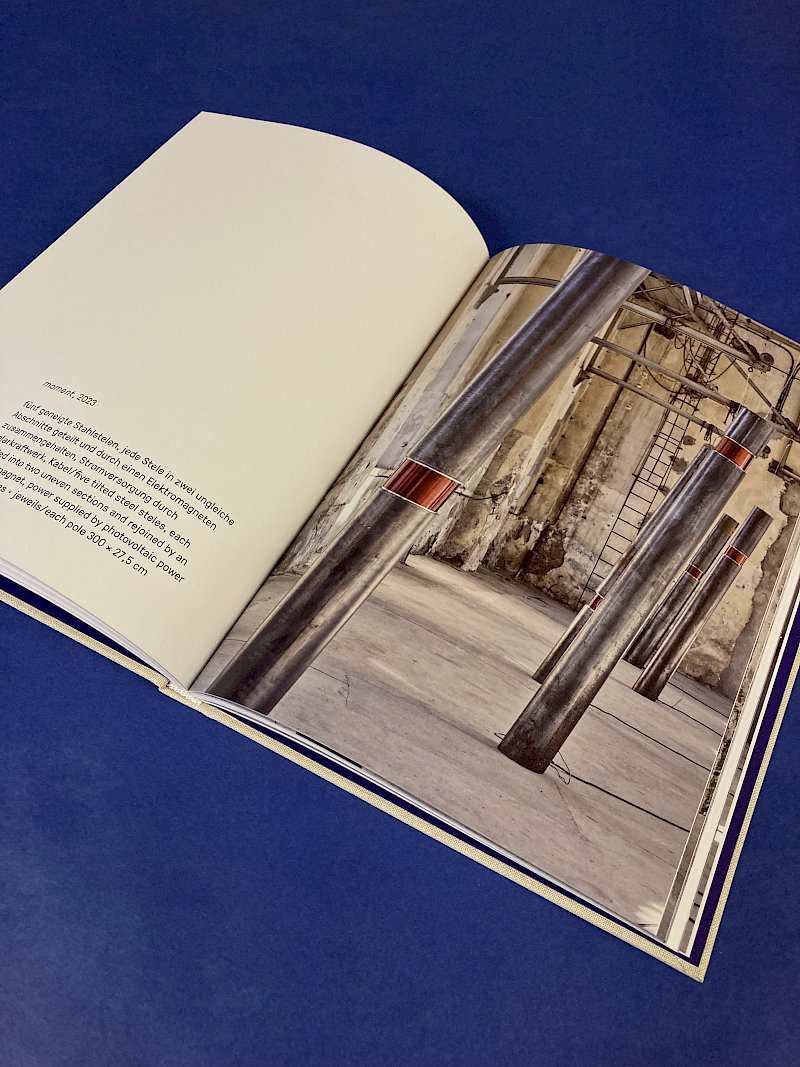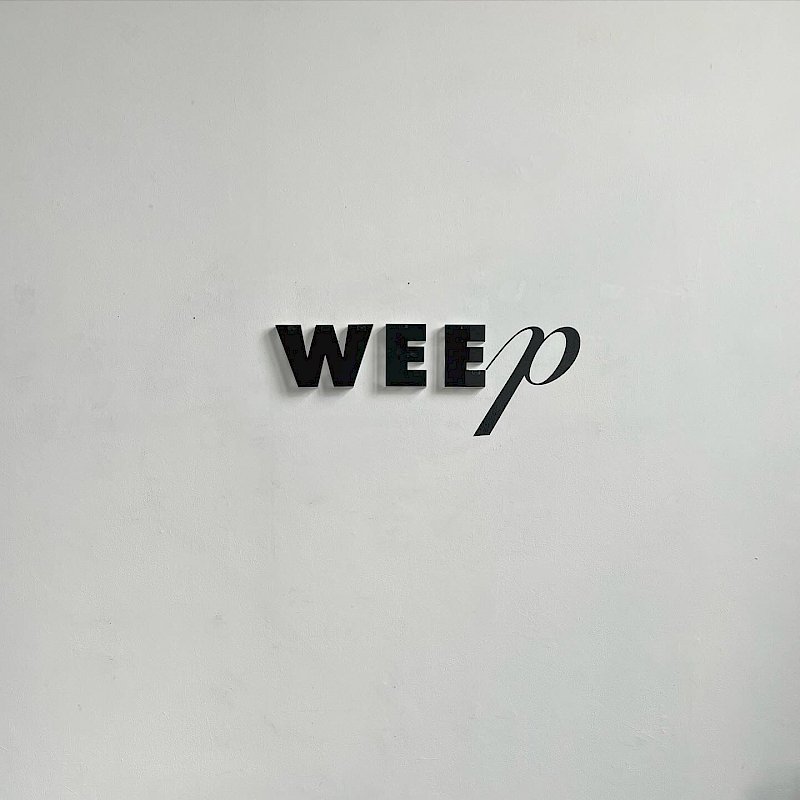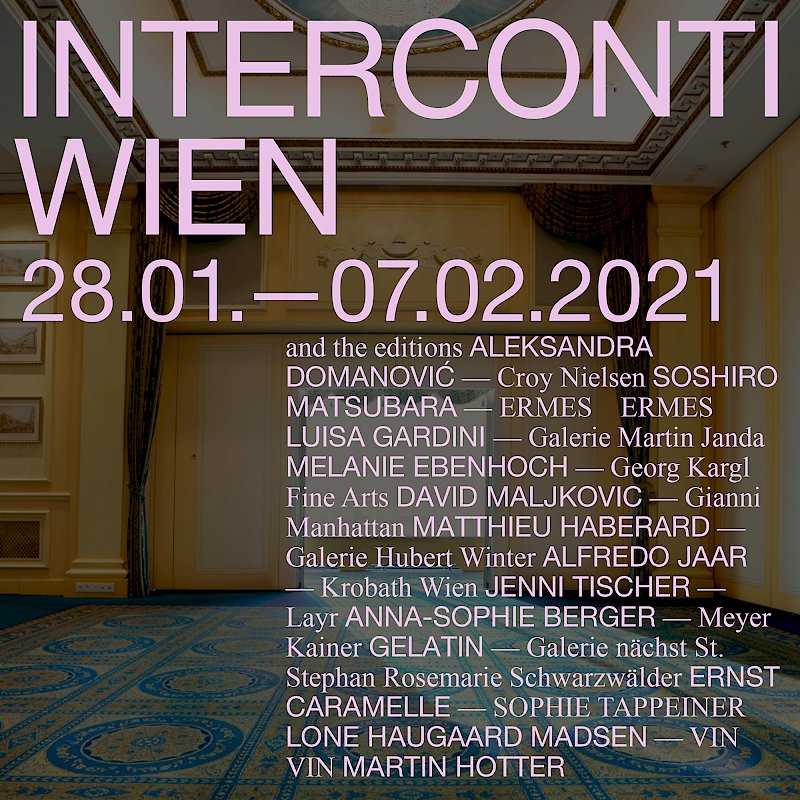Galerie Hubert Winter
April 20 – November 24, 2024

We are very pleased to announce the participation of Simone Fattal at the 60th Venice Biennale.
This year the Holy See Pavilion will take place in the women's prison in Venice at the Giudecca island. The exhibition, titled With My Eyes, is curated by Chiara Parisi and Bruno Racine.
Simone Fattal will present an installation which includes poems contributed by some of the prisoners at Giudecca.
Find more information here.
April 5–May 18, 2024
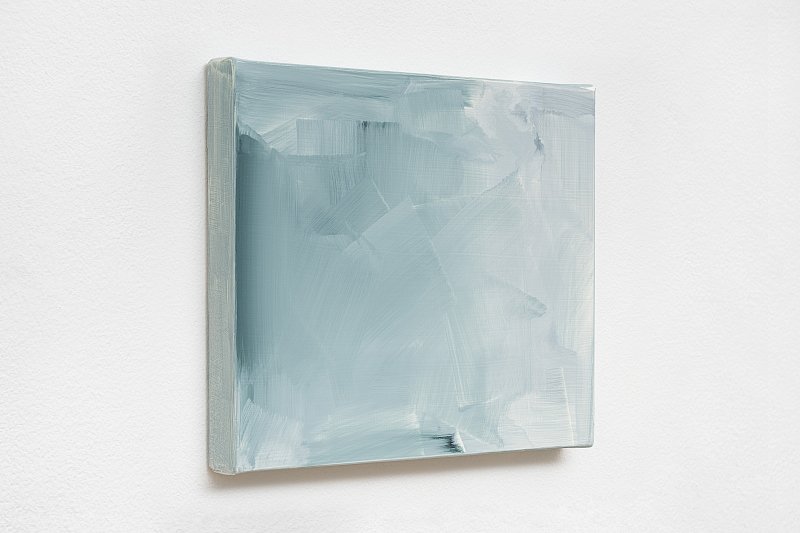
Nancy Haynes: Dialectics of Silence, will be the American painter’s inaugural exhibition in the United Kingdom, opening on Thursday, April 4, 2024 at Marlborough London. The exhibition features a selection of Haynes’s book-sized paintings from the series – library, dedicated to a pantheon of writers, important to the artist.
Follow this link for more information.
March 13, 2024

We are delighted to announce that Jojo Gronostay is one of the winners of this year's Dorothea von Stetten Art Award. The accompanying exhibition will open on March 13 at the Kunstmuseum Bonn. You can find more information here.
March 18, 2024

We are delighted to announce that Simone Fattal is the winner of this year's Berlin Art Prize. The jury which consisted of Monica Bonvicini, Karin Sander and Wolfgang Tillmans made the following statement: “Simone Fattal once reflected, ‘Everybody has to undertake their own travels toward knowledge, and then make a choice.’ Fattal has not only undertaken her journey but has invited us all to join her in this exploration of human equilibrium and the balance between the tangible and the imaginable. Her practice is a testament to the enduring power of storytelling and the ability of creativity to advocate for humanity and community. What sets Fattal apart is a profound humanism, an urgent call to address the present through history, and history through the present.” Find out more here.
February 22–25 2024
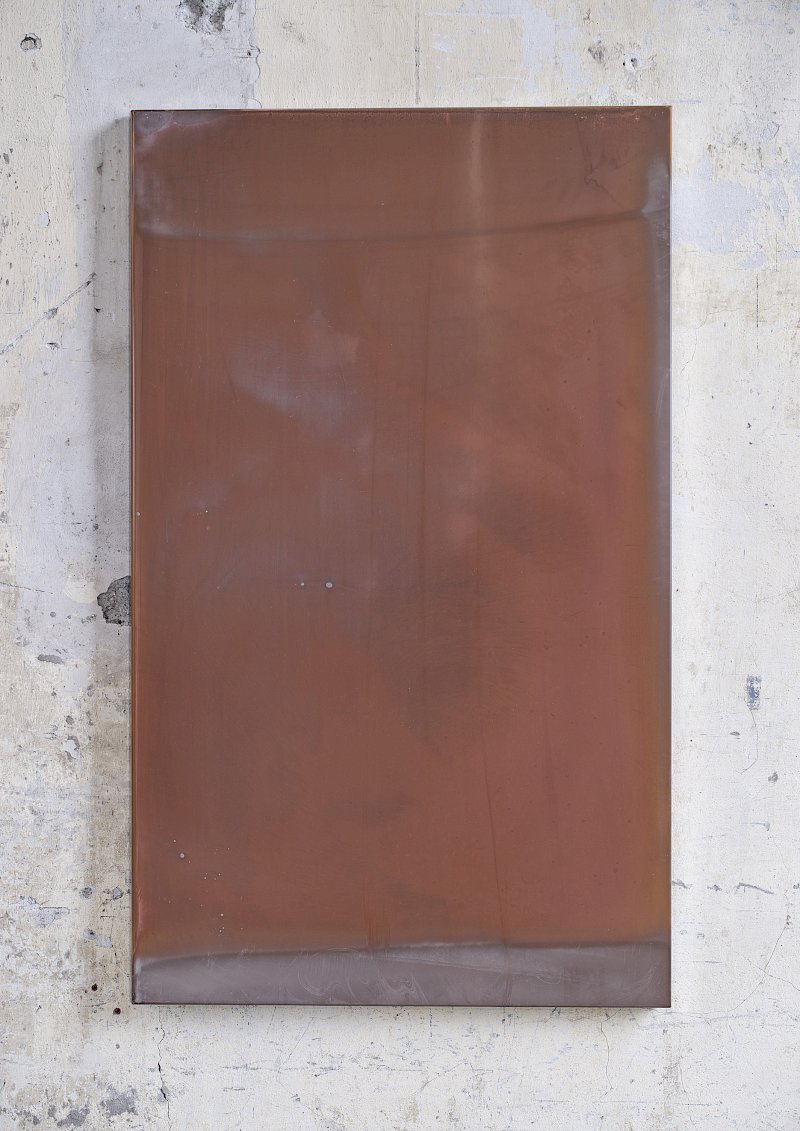
Folgen Sie diesem Link für mehr Information.
January 30, 2024

Furr further information and all events associated with the 9th Biennale Gherdëina: The Parliament of the Marmots, curated by Lorenzo Giusti with Marta Papini as associate curator, follow this link
January 26 – 27, 2024

For a detailed program of the complete series of talks and the "growing exhibition" please visit Museo della Montagna Turin.

It is with the utmost sadness that we acknowledge the passing of
the outstanding conceptual artist William Anastasi.
"His pieces, for all their simplicity, are not mute. They are argumentative; they deflect our energy,
and like a ball hitting a Wall, they come back at us at a different angle."
(Richard Kalima, William Anastasi: Deadpan Conceptualist, in: Art in America, 1990.)
We are incredibly grateful for having been able to work together for 26 years.
Our thoughts are with Dove Bradshaw and all his beloved ones.
"So it was as though for a moment, as an artist, I had sensed a little bit
of the morning, the day after. I thought, you show me a wall and I’ll show you a beautiful work of art; you show me a place where you want art to go and
I’ll show you the place itself as art."
William Anastasi, in “A Conversation” between him and the author Thomas McEvilley, published in: Thomas McEvilley, “William Anastasi: Selections of the Work from 1960 to1989.” New York, Scott Hanson Gallery, 1989.
November 18 – December 17, 2023

His art: like a planet –so many things, completely unique, always recognizable. Franz Vana shows the contradictions of our epoch, the opposites, irresolvable dilemmas: words and numbers, seemingly reasonable, in contrast to the images – an irrational world of sensations. Beauty, sadness, melancholy, all in one, we encounter them in this work - radically and directly. We see a valid counter-world to the madness of our civilization.
10. November – 17. Dezember 2023

In Sol LeWitt's Wall. Performed, the conceptual painter Franz Vana follows performative interventions by Jasmina Cibic, Franz Jochum and Winfried Ritsch. Engaging with the theme Artwork and Work, Vana contrasts LeWitt’s constructed Wall with expressions in painting that can be experienced both in conceptual and physical terms, confronting the monumental wall as compositions of form.
Franz Vana (*1951) uses language and formal painting discourses for his distanced and surreal image analyses. The serial combination of related vocabularies in word and image becomes a conceptual method of evaluating fixed imaginaries. Humour sometimes serves as a weapon used against himself, irrational ideas are followed in a logical and consistent way, just as Sol LeWitt proposed in his Paragraphs on Conceptual Art back in 1967. Honed over decades, Vana’s consistency in critical and precise painting makes him one of the most interesting outsiders of Austrian art in his generation and an exemplary counterpart to Sol LeWitt’s conceptual artwork of the modular Wall drawn through space.
‘Word pictures’ alternate with ‘Sunday pictures’. While semantic recombinations appear on the one hand, geometric shapes and forms are mixed on the other. This reconfiguration becomes a poetological game and an exploration of irrational patterns and narratives.
More information under this link.
via Giacomo Mattè Trucco 70, Turin
November 3–5, 2023

We are pleased to present a selection of works by Michael Höpfner & Richard Nonas.
November 2–5, 2023

MAUTO
Corso Unità d'Italia 40, 10126 Torino
On the occasion of Artissima, the MAUTO shows – in the days of the fair – the special installation The Velocity of Thought by the artist Paul Etienne Lincoln: designed and built in 1976 and modified several times over the years to reach the current look, the work has as its center a prototype car in full scale, equipped with motor Panhard Levassor Tigre of derivation aereonautica, fed to gasoline, propane and oil of flax.
November 1, 2023 – March 31, 2024
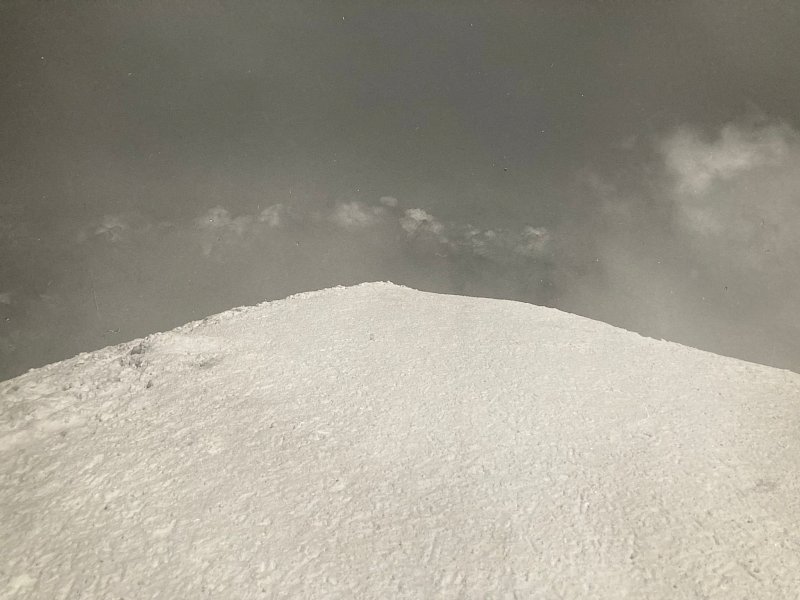
Museo Nazionale della Montagna
Piazzale Monte dei Cappuccini 7, 10131 Torino
The exhibition Stay with Me by Michael Höpfner and Magda Drozd takes its cue from German sociologist Hartmut Rosa’s Resonance. A Sociology of Our Relationship to the World to explore the concept of resonance. Not in the sense of total harmony but as a dynamic relationship wherein subject and world touch each other to stimulate vibrancy and mutual transformation.
October 13, 2023

October 13, 6-10 pm
HOUSE
Friedrichstr. 112B, 10117 Berlin
The exhibition ‘Very Friendly‘ speaks of violence that becomes an environment—an everyday landscape of somatic unease and confinement, filled with a sense of volatility, disquiet and alienation. Taking its title from Throbbing Gristle’s song about Ian Brady and Myra Hindley, the exhibition traces the moments of pre- and post-violence, the invisibility of systemic cruelty and the orchestration and management of fear. Political and personal uncertainty and the ambivalence of one’s safety seep through the cracks in the floor and broken windows, implanting themselves in the scratches on the walls, moving silently and stilly—resulting in a psychological state that approaches madness.
With: Adam Alessi, Davide Allieri, Angélique Aubrit & Ludovic Beillard, Darja Bajagić, Blackhaine, Allen-Golder Carpenter, Romeo Castellucci, Maggie Dunlap, Adam Gordon, Anne Imhof, Jack Kennedy, Sibylle Ruppert, Throbbing Gristle, Minh Lan Tran, Rosemarie Trockel, Mauro Ventura
September 14, 2023 – February 25, 2024

August 31, 2023 – January 28, 2024

This is his inaugural solo presentation in both South Korea and in Asia as well as the first comprehensive show within an institutional context since his passing in 2021.
429 11th Avenue, NY 10001
September 8–10, 2023

We are pleased to present a selection of works by the artists Mary Ellen Carroll, Simone Fattal, Jojo Gronostay, Michael Höpfner, Birgit Jürgenssen, Katherine Porter and Franz Vana.
August 27, 2023 – January 1, 2024

June 24–September 24, 2023

Curated by Liberty Adrien and Carina Bukuts
Opening: June 23, 2023, 6pm
Please follow this link for more information.

June 21 – July 2, 2023

from May 25, 2023


April 22 – November 5, 2023

January 28 – July 30, 2023

June 7, 2023
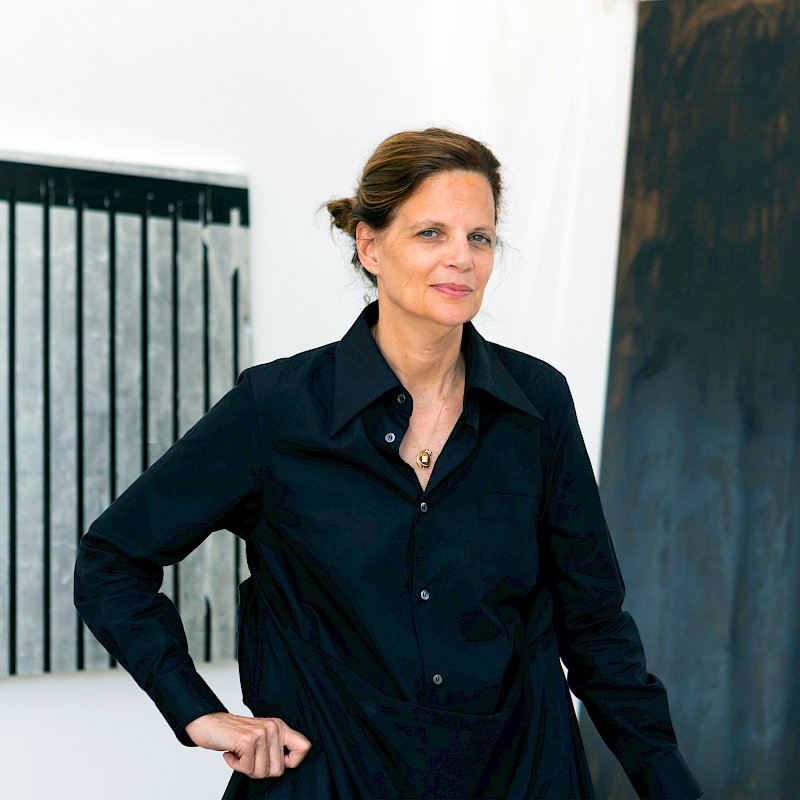
May 13 – October 1, 2023

March 29–August 27, 2023
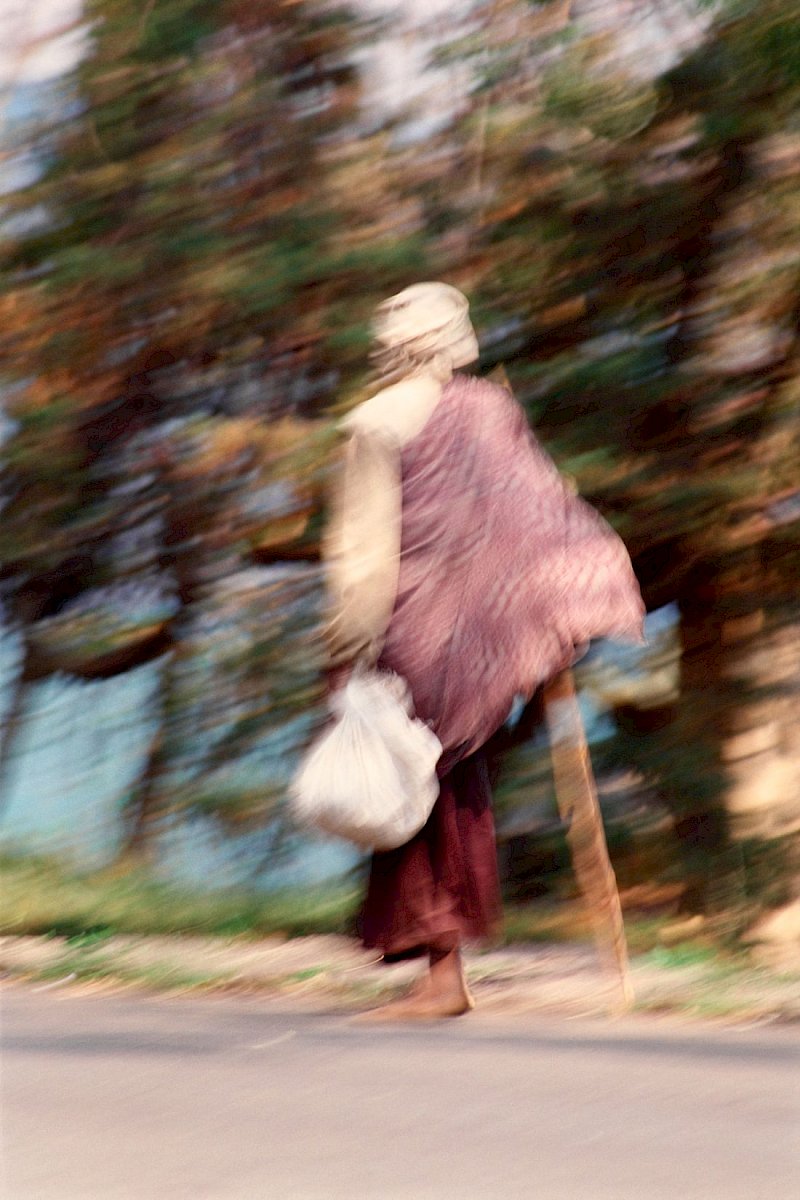
In the rotunda of the Pinakothek der Moderne, the artist, architect and filmmaker Alfredo Jaar, who was born in Chile and lives in New York, shows why he is considered one of the most culturally, politically and socially committed visual artists of our time. The late Okwui Enwezor wrote: "Alfredo Jaar's work represents one of the most committed of any contemporary artist, blatantly exploring the structural connection between ethics and aesthetics, art and politics". The artist explores complex socio-political issues and prioritizes the ethics of representation. In his quiet and meditative works, Jaar engages with issues of profound importance, bearing witness to humanitarian catastrophes and the effects of military conflict, political corruption and economic inequality around the world.
Opening: 28 March 2023, 7 pm
Talk Alfredo Jaar: 29 March 2023, 7 pm, Ernst von Siemens-Auditorium
Follow this link for more information.
March 17–July 2, 2023

With works by Andreea Albani (RO), Ștefania Becheanu (FR/RO), Andrei Bucovanu (RO), Mircea Cantor (FR/RO), Ștefan Curelici (RO), Judith Fegerl (AT), Adrian Ganea (RO), Marie-Claire Messouma Manlanbien (FR), Sebastian Moldovan (RO), Ciprian Mureșan (RO), Cristian Rusu (RO), Sinta Werner (DE), Anna Zvyagintseva (UA).
Curator: Diana Marincu
Please follow this link for more information.
Skyway Monte Bianco, Courmayeur
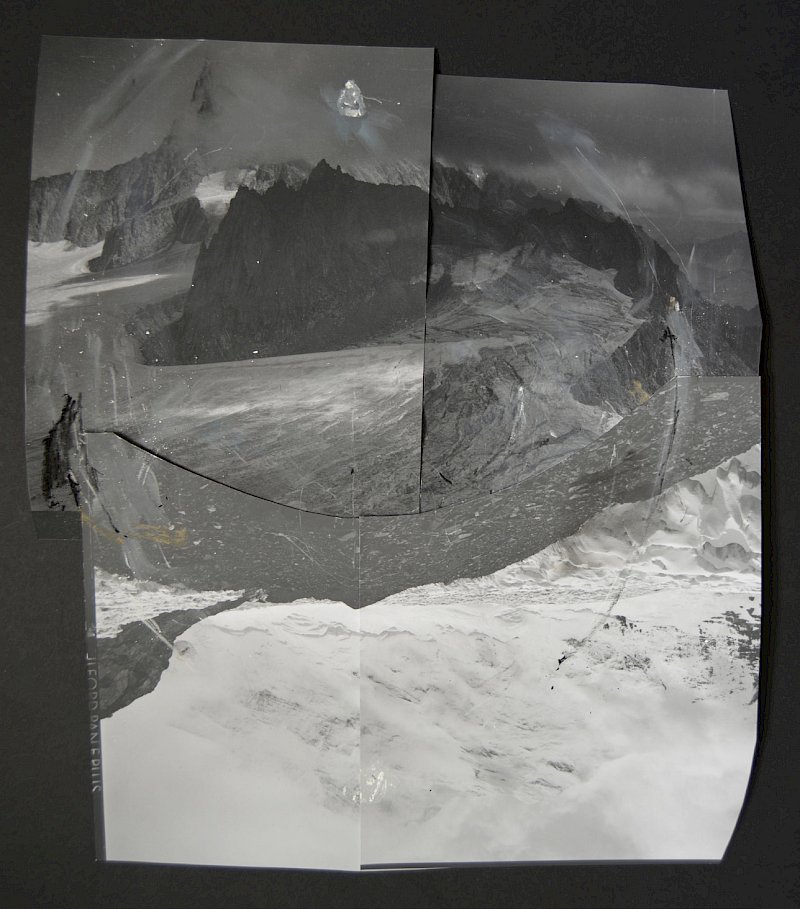
Paolo Agliardi – Andrea Cuomo – Enrico Giliberti
Galleria Michela Rizzo – Galerie Hubert Winter – Humboldt Books
Presentation of the book "From Here to Tibet—a conversation between two walking artists" published by Humboldt Books Milano with Andrea Lerda, curator, Museo della Montagna Torino.
February 24 – June 18, 2023
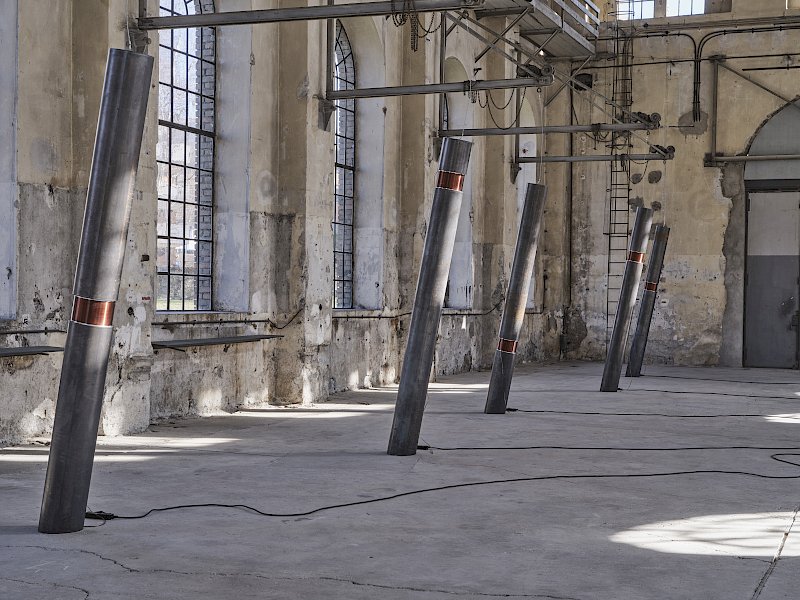
Please follow this link for more information.
November 16 – December 23, 2022

Please follow this link for more information.

Main Section
Corridor Black
Booth 12
Follow this link for more information
October 28, 2022, 7pm
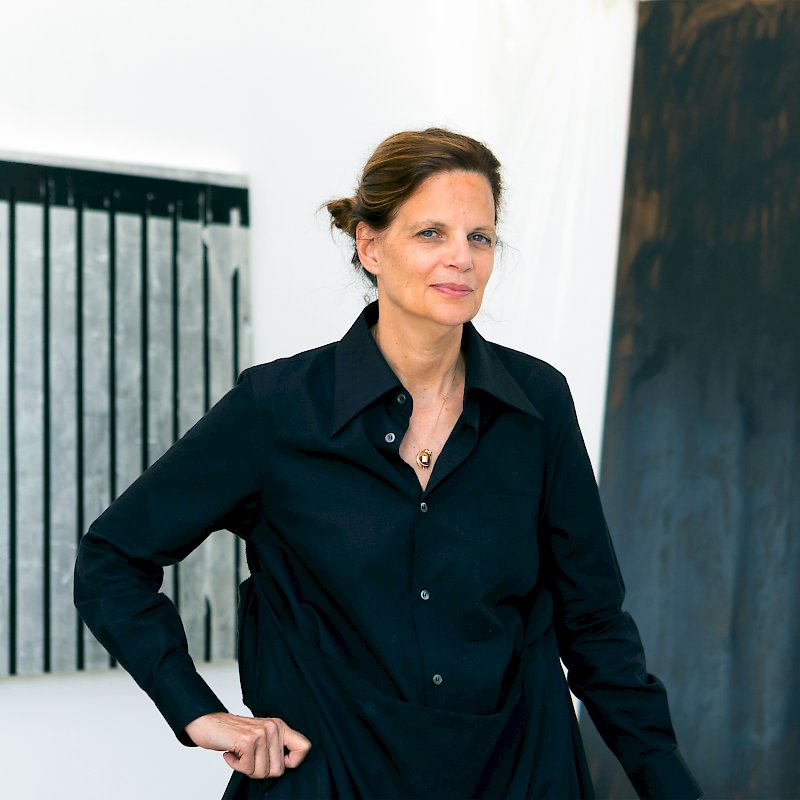
On the occasion of the opening of her show THEIR TABLE IS TOO LONG, Mary Ellen Carroll invited the Austrian composer and musician Rupert Huber for the performance titled The Wrong Door—referring to the exile and the writing and life of Natalia Ginzburg—the Italian writer, politician, and anti-fascist. This will be the first public presentation of the performance in the development of a collaboration.
The Wrong Door
A performance by
Rupert Huber live
FM by Mary Ellen Carroll / MEC, studios
Rubert Hubert is an Austrian composer, music artist and musician, based in Vienna. Music by Rupert Huber is organized structures, sounds and tones for multiple known and unknown real and electronic spaces: Dimensional Music. He is also known for his group TOSCA—together with Richard Dorfmeister—releasing 14 albums over the last 20 years.
October 28 – December 30, 2022

Judith Fegerl (*1977 in Wien) arbeitet mit dem Material Energie. Ihre Skulpturen, architektonischen Interventionen und Raumzeichnungen verhalten sich wie Transformatoren und schalten sich in die Substanz des Ausstellungsraumes ein. Judith Fegerls Werk macht
diese chronische Elektrizitätsabhängigkeit höchst eindringlich sichtbar, wenn sie etwa Metallarbeiten schafft, deren ganzer Zusammenhalt von Elektrizität abhängt, elektrische Schnittstellen des Ausstellungsortes angezapft werden oder Arbeiten – ganz autark – Strom erzeugen. Energie und Spannung wird in Objekte verdichtet, die den Skulpturenbegriff um einen alternativen Zustand erweitern, beunruhigende Zusammenhänge erzeugen und nicht zuletzt auch den menschlichen Körper in einer zunehmend dematerialisierten Umgebung reflektieren. Sie lebt und arbeitet in Wien.
* Nina Tabassomi, aus dem Text: Judith Fegerl, in charge, 2017
Ebenfalls präsentiert werden Werke von:
Hanna Besenhard/ Michael Jimenez/ Isi Rosenberg/ Luca Sabot/ Miriam Schenkirz/ Egor Urakov
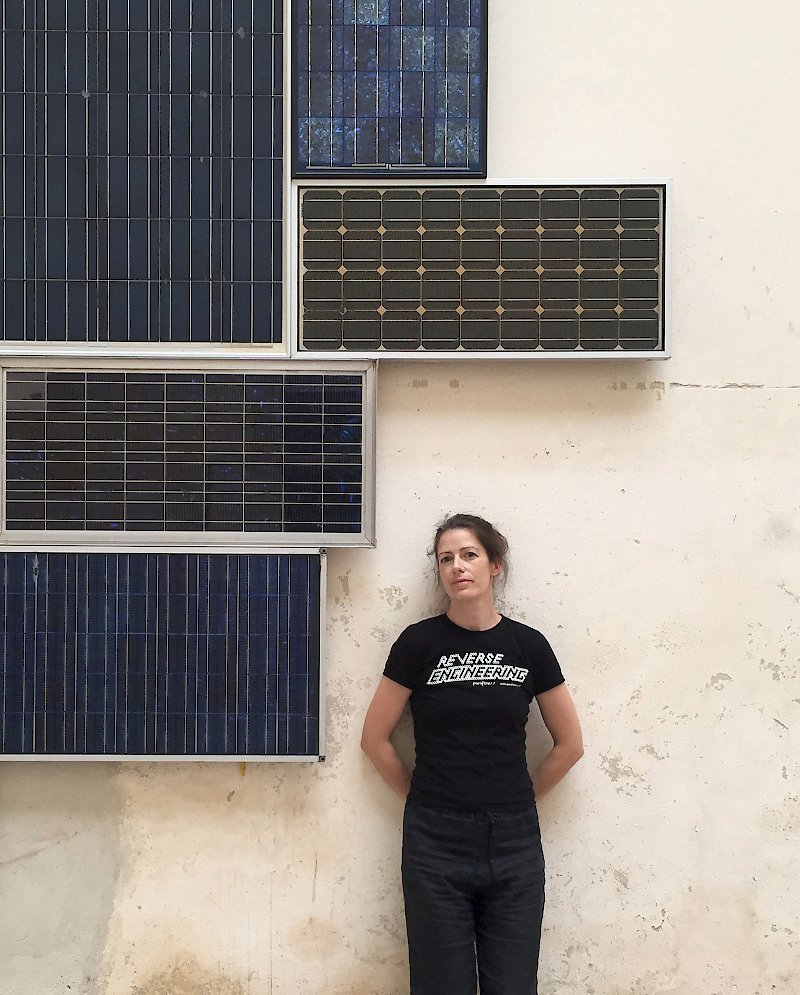
Preisstifterin Dagmar Chobot und Bildrecht-Geschäftsführer Günter Schönberger vergeben den Dagmar Chobot Skulpturenpreis 2022 an Judith Fegerl. Der Nominierungspreis würdigt die vielfältigen Präsentationen, in der die Künstlerin die Schnitt- und Anschlussstellen von Technik und Körper, Technologie und Bewusstsein, anorganischer und organischer Materie sowie das Potenzial von Energie sichtbar macht.
Judith Fegerls Skulpturen, architektonische Interventionen und Raumzeichnungen verhalten sich wie Speicherorte unsichtbarer Energie. Ihr „ Co-Laborieren mit einer unsichtbaren Kraft“, wie Fegerl ihre Strategie in der Handhabung von Strom beschreibt, fordert die Substanz des Ausstellungsraumes heraus – oftmals mit unvorhersehbaren Ergebnissen. Ihre Auseinandersetzung mit unterschiedlichen Phasen der Erzeugung, der Verteilung und der Speicherung von Energie verweisen dabei auf unsere Elektrizitätsabhängigkeit – einen auf vielen Ebenen spürbar werdenden Spannungszustand, den die Künstlerin in die klassischen Leiter Aluminium, Kupfer und Messing übersetzt und geschickt in ein energetisches Gleichgewicht zu bringen versucht. Die Werke bedienen sich dabei mancherorts ungeniert an den vorherrschenden Ressourcen, indem sie etwa die Stromquellen des Ausstellungsortes anzapfen, oder sie lösen sich gänzlich aus unserer Kontrolle, funktionieren autark.
Judith Fegerl wirft zentrale Fragen des Anthropozäns auf, insbesondere inwiefern sich das Verhältnis zwischen Mensch und Technologie wandelt und welche Spuren Energie in unserem Leben hinterlässt. So bietet ihr photovoltaisches “End-of Life”-Szenario sunset (2021/22) nicht nur faszinierende Detailansichten auf die gewebeartigen Strukturen von Solarpaneelen und deren schillerndes, polykristallines Silizium, sondern macht zudem die Folgen ihres jahrzehntelangen Einsatzes als Stromerzeuger sichtbar. Mit der Werkserie verdeutlicht Fegerl unsere Anstrengungen, der Abhängigkeit von Erdöl und Erdgas zu entrinnen und erweitert den Skulpturenbegriff um einen alternativen Zustand. Diese Faszination am Wesen der Energie verdeutlicht sich in einer Vielzahl skulpturaler Arbeiten, etwa, wenn Judith Fegerl Stromleitungen kontrolliert überlastet und mit deren glühend heißem Draht Brandspuren auf Galeriewände zeichnet (cauter, seit 2012), oder wenn sie schwere Edelstahlplatten einem galvanischen Bad und somit einer elektrochemischen Transformationen unterzieht (series of electric shocks, 2021). Immer gilt: das eigentliche Objekt ist niemals (nur) das, was man sieht. Es ist das, was zwischen den Platten, Stäben und Stromleitern passiert, was Judith Fegerl antreibt und, wie Martin Kugler bezeichnend zusammenführt: „Ihr Werk ergibt sich aus der Kombination des Potenzials, das in der Energie steckt und den physischen Artefakten, in denen diese Kräfte wirksam werden.“ (Begründund der Jury)
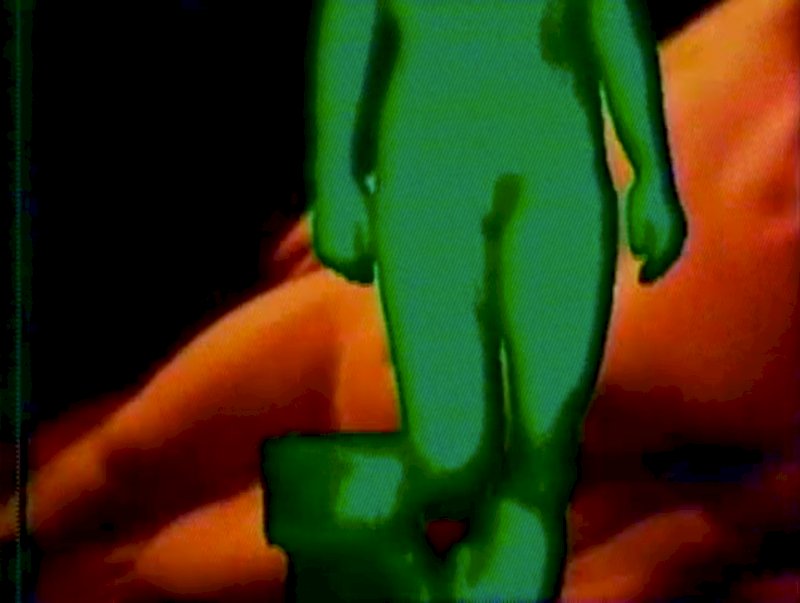
We are very pleased to present at this year's edition of Frieze London a selection of works by
SIMONE FATTAL, JUDITH FEGERL, BIRGIT JÜRGENSSEN, SHIGEKO KUBOTA and SARAH PICHLKOSTNER.
Galerie Hubert Winter
Booth G18, Main Section
PREVIEW
October 12 & 13, 2022
11am–6pm
PUBLIC OPENING HOURS
October 14–16, 2022
Friday & Saturday 11am–7pm
Sunday 11am–5pm
The Regent’s Park
London
Get an insight via the Online Viewing Room of Galerie Hubert Winter.
For tickets and further information on the fair follow this link.
September 3, 2022, 10am–8pm

In the context of the (Con)temporary Fashion Showcase series, a video installation by Jojo Gronostay can be seen under the title MAGIC CANNOT CROSS THE SEA. In it, he examines the so-called sapeurs of Brazzaville (Republic of the Congo)—mostly men from precarious circumstances who wear designer suits and attribute a spiritual dimension to their apparel. They make the streets their catwalk with seemingly choreographed movements. At the same time, Gronostay examines the Eurocentric conception of fashion upon which the historical costume collections of museums of applied arts like the MAK are based by superimposing museum objects onto the video recordings.
Follow this link for more information.
Hamburger Kunsthalle


August 6 – 20, 2022
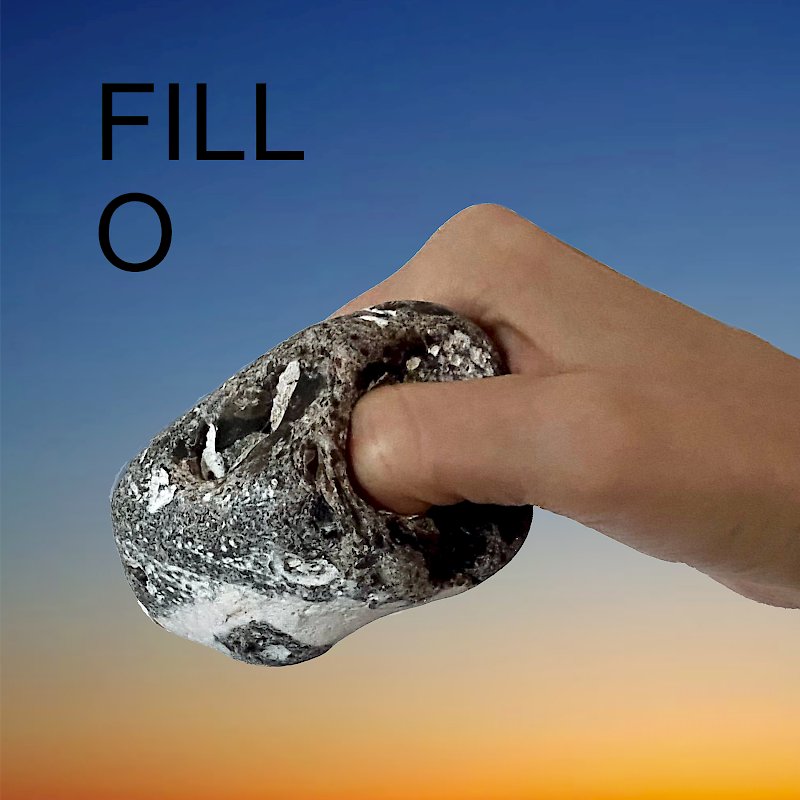
Fill O is the second part of an organisational exchange with P/////AKT, Amsterdam, with whom Sarah Pichlkostner realised the solo exhibition If the moon was a cookie in 2018. The first part of the exchange, I didn’t think it would turn out this way took place at P/////AKT from 13th November – 19th December 2021. The exchange was made possible with the support of the Amsterdam Fund for the Arts, Mondriaan Fund and Ammodo.
Sarah Pichlkostner (1988, Austria) creates sculptures and environments through which she investigates the representation of invisible processes: the transmission of energy, the passage of time, and our psychological responses to materials and things. Or as she puts it: when material is brought to an object, i.e. is made into one, and the function of this object is continuously developing over time, then the object is ultimately reflecting us.
Follow this link for more information.
May 5–8, 2022

Independent Art Fair
Spring Studios
50 Varick Street
New York, NY 10013
5th Floor
VIP Preview
May 5, 2022
11AM – 8PM
Fair Days
May 6–8, 2022
Friday & Saturday 12AM – 7PM
Sunday 12AM – 6PM
Follow this link for more information and tickets.
April 7, 2022, 6:30 pm
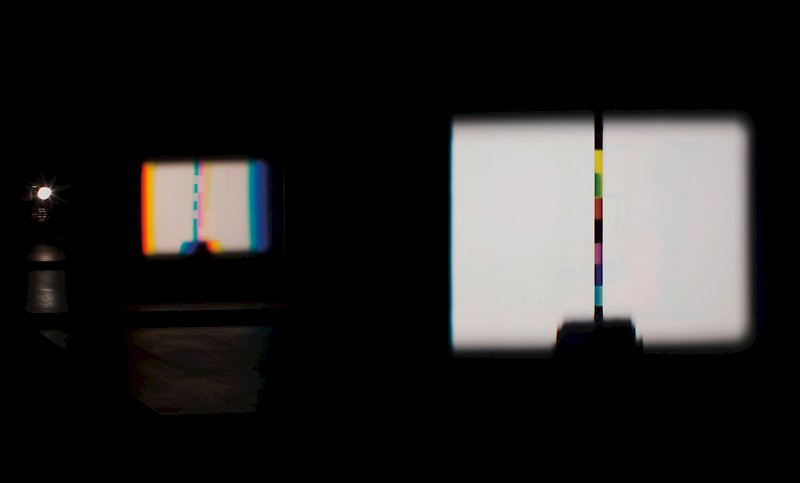
Das bildnerische Werk des Malers und Farbforschers Ingo Nussbaumer umfasst Gemälde, Lichtobjekte und Farbe im Raum. Es ist nicht nur die absolute Geometrie, die Ingo Nussbaumer beherrscht, es sind auch die Farben, die seine künstlerischen und theoretischen Arbeiten bestimmen. Anhand von zwei ausgewählten Gemälden der Sammlung Leopold wird Nussbaumer zum Thema „Malerei und Farbenlehre" sprechen und seine künstlerische und wissenschaftliche Arbeit an der Farbe im Vortrag vorstellen.
mumok, Vienna

Jojo Gronostay is nominated for this year's Vordemberge-Gildewart Stipendium and showing his work at mumok in Vienna.
The Vordemberge-Gildewart Foundation awards an annual grant to support an independent visual artist or art writer aged 35 or under living in Europe. The nominees for this year's award will present their works at mumok.
Please follow this link for further information.
June 25 – September 25, 2022

Temporary Atlas: Mapping the Self in the Art of Today presents a selection of works that explore an alternative, complementary idea to cartography, the traditional science or practice of drawing maps. They propose perceptive and physical maps that provide insight into the artists’ personal experiences, whilst evoking mental landscapes within which the viewer can orientate themselves; worlds beyond objective geographical coordinates.
Follow this link for more information.

Nil Yalter (b. 1938) has received the outstanding merit award for artists along with the Vera Molnar (b. 1924) at this year's Prix AWARE.
This jury panel is composed of Alfred Pacquement (honorary general heritage conservation officer, former director of the musée national d’Art moderne – Centre Pompidou), president of the panel, Alexia Fabre (director and head curator of the MAC/VAL, Vitry-sur-Seine), Stijn Huijts (director of the Bonnefantenmuseum, Maastricht), Dominique Guyot (collector), Camille Morineau (director of exhibitions and collections of the Monnaie de Paris, co-founder and chairwoman of AWARE), Frances Morris (director of Tate Modern, London) and Floriane de Saint Pierre (collector).
November 1 - 3, 2019

corridor green / Booth 13
online catalogue
OVAL Lingotto Fiere, via Giacomo Matté Trucco 70, Turin, Italy


Birgit Jürgenssen (1949-2003) was among Austria’s avantgarde in the 1970s, alongside Valie Export and Maria Lassnig. While alluding to art-historical traditions like Surrealism, she unobtrusively developed an independent oeuvre that included not only a large stock of drawings, but also sculptures, experimental objects, videos and, above all, photographs. The Kunsthalle Tübingen is showing the first comprehensive presentation of this artist’s work in Germany under the heading “I am.”.
The female body is the lynchpin of Birgit Jürgenssen’s work. Not only is the body the subject of the realistic-style drawings with which she portrayed her lifeworld with considerable self-irony, it is also the agency of first experiences which she explores as a psychological-mental and emotional resonance chamber. In more than 1000 drawings she captured with seismographic sensitivity what occurs before our conceptual and thus conscious grasp.
She reflected on and deconstructed human relationships, sexuality, socially-determined notions of beauty and gender relations with a subversive humour as if they were deeper layers of her own identity.
In keeping with the social turmoil in the 1970s she responded perceptively and critically to an increasingly industrialised and thus “demystified” environment and, guided by a sensual-instinctive sensitivity, marked out the affinity between man, plant and animal. In the tradition of the Surrealists, she transformed the human body, the animal and plants into hybrids in dream-like scenarios. By equating the human body with the vascular system of leaves, she productively adapted old concepts of the micro-macro-cosmos to the present day. Her drawings, collages and photomontages are characterised by a vigorous fantasy in the face of nature and testify to an integral awareness that we exist in an invisible interaction with the world around us.
The wide-ranging oeuvre of Birgit Jürgenssen is interesting not just as a collective contemporary testimony that reflects the sense of life and the zeitgeist from the 1970s to 1980s and 1990s. Even today, when we are experiencing an increasing levelling of everyday perception due to digitization, her body-related approach takes on a whole new topicality. Her work is rooted in the realm of the intimate and thus stand not least for an authentic self-directed life and, ultimately, also for the self-determined and emancipatory impetus of art.
The retrospective exhibition is being organised in close cooperation with the Estate Birgit Jürgenssen / Vienna:
Curators:
Dr. Nicole Fritz, Natascha Burger (Estate Birgit Jürgenssen)
Main lenders:
Estate Birgit Jürgenssen, Vienna
Private lenders
Sammlung Verbund, Vienna

Umrahmung schräg gekippt. Die Sammlung Liaunig in Bewegung.
curated by Günther Oberhollenzer
artists: Marc Adrian, Bernard Aubertin, Joannis Avramidis, Joachim Bandau, Josef Bauer, Hans Bischoffshausen, Alighiero e Boetti, Hellmut Bruch, Tony Cragg, Gunter Damisch, Inge Dick, Heinrich Dunst, Manfred Erjautz, Johann Feilacher, Karl Anton Fleck, Gerhard Frömel, Heinz Gappmayr, Jakob Gasteiger, Bruno Gironcoli, Roland Goeschl, Dorothee Golz, Franz Grabmayr, Franz Graf, Evelyn Gyrcizka, Alfred Haberpointner, Hans Hartung, Julie Hayward, Rudolf Hoflehner, Giselbert Hoke, Wolfgang Hollegha, H+H Joos, Martha Jungwirth, Franco Kappl, Herwig Kempinger, Gudrun Kleinberger, Michael Kienzer, Imi Knoebel, Kiki Kogelnik, Peter Kogler, Kurt Kocherscheidt, Franz Stefan Kohl, Peter Krawagna, Suse Krawagna, Eric Kressnig, Richard Kriesche, Maria Lassnig, Christoph Luger, Gottfried Mairwöger, Dóra Maurer, János Megyik, Jürgen Messensee, Josef Mikl, Hannes Mlenek, Kurt Moldovan, Walter Moroder, Gerhardt Moswitzer, Robert Motherwell, Matt Mullican, Hermann Nitsch, Ingo Nussbaumer, Franz Xaver Ölzant, Fritz Panzer, Max Peintner, Helga Philipp, Walter Pichler, Josef Pillhofer, Raimund Pleschberger, Rudolf Polanszky, Markus Prachensky, Karl Prantl, Maria Elisabeth Prigge, Arnulf Rainer, Werner Reiterer, Alois Riedl, Franz Rosei, Georg Salner, Fabian Seiz, Roman Scheidl, Meina Schellander, Alfons Schilling, Eva Schlegel, Walter Schmögner, Martin Schnur, Klaus J. Schoen, ManfreDu SCHU, Christian Schwarzwald, Pierre Soulages, Rudi Stanzel, Hans Staudacher, Esther Stocker, Erwin Thorn, Andreas Urteil, Wolfgang Walkensteiner, Franz Erhard Walther, Markus Wilfling, Max Weiler, Fritz Wotruba, Franz Zadrazil und Heimo Zobernig.
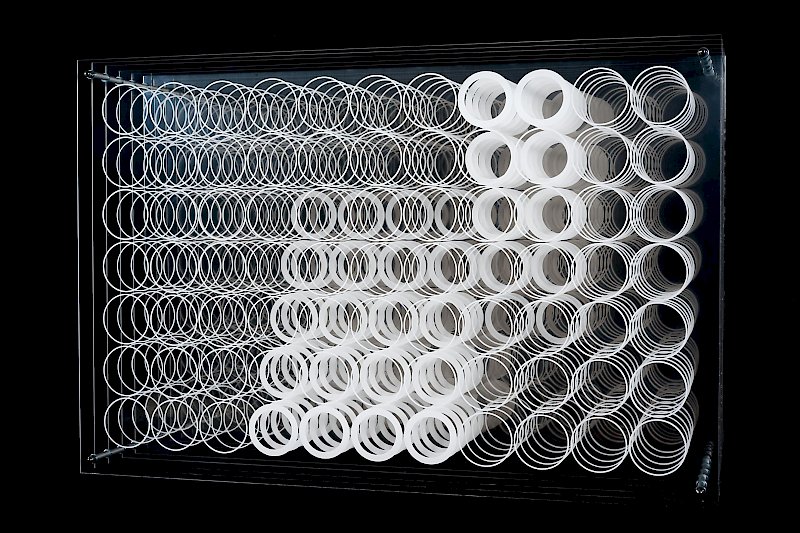
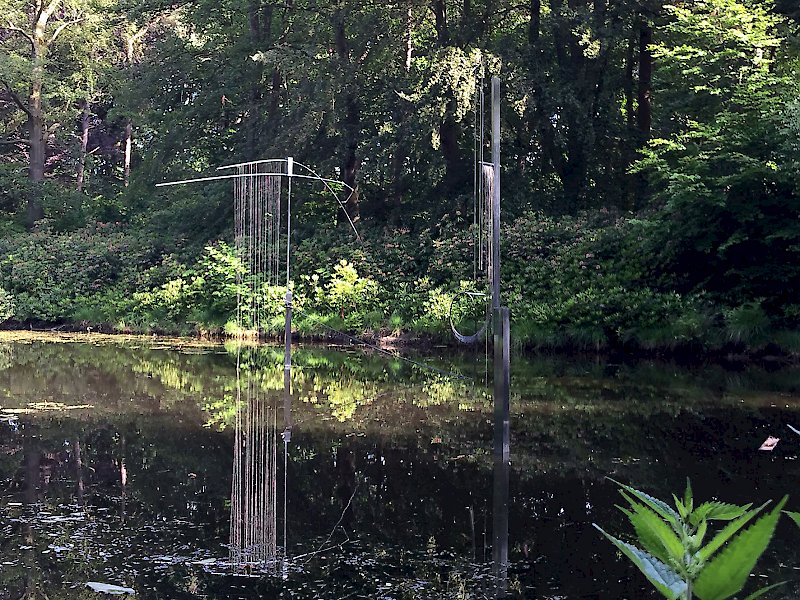
Hybrids focusses on a generation of young artists, often labeled as post-internet, which takes our global, digital, and image-saturated world as a starting point for their work. This results in a vocabulary that is strikingly hybrid in character.
Hybrids will present new works by
Neïl Beloufa (FR), Giulia Cenci (IT), Simon Denny (NZ), Oliver Laric (AU), Sarah Pichlkostner (AU), Timur Si-Qin (DE), Evita Vasiljeva (LV), Anne de Vries (NL), Raphaela Vogel (DE) and Dan Walwin (GB).
Curators: Chris Driessen & David Jablonowski

Artists: Ei Arakawa / Nikolas Gambaroff, Georg Baselitz, Nina Beier, Andy Hope 1930, Barbara Mungenast, Paulina Ołowska, Yan Pei-Ming, Imran Qureshi, Shuvo Rafiqul, Franz Schubert, Sung Tieu, Danh Vō, Kay Walkowiak, Hans Weigand, Guan Xiao, Lei Xue, Jakub Julian Ziółkowski
Curator: Goschka Gawlik
for more information please visit: manggha.pl
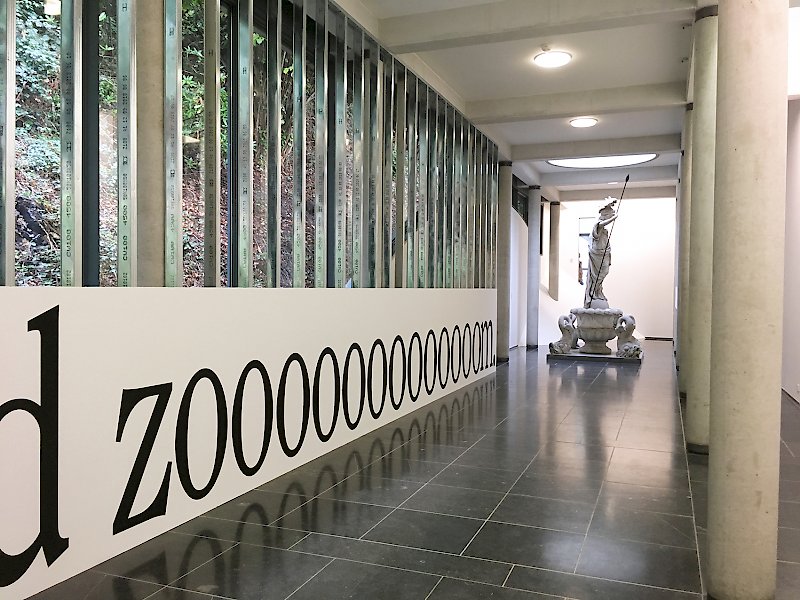
Mit einer umfassenden Einzelausstellung von Haim Steinbach (*1944 in Rehovot, Israel) präsentiert das Museum Kurhaus Kleve einen der einflussreichsten Künstler der Gegenwart.
Steinbach prägt die Kontextbefragung von Objekten entscheidend, indem er anders als seine Malerkollegen von Beginn an mit Objekten und ihrer Zurschaustellung arbeitete. Fälschlicherweise aufgrund seiner Verwendung von Konsumgütern als Anhänger von „Consumer Culture“ bezeichnet, drehen sich seine Arbeiten weniger um den Status als Ware als vielmehr um die Selektion und das Arrangement von Alltagsobjekten sowie den damit verbundenen Eigenschaften. Die Einzelausstellung von Haim Steinbach im Museum Kurhaus Kleve entsteht in Kooperation mit dem Museion in Bozen.

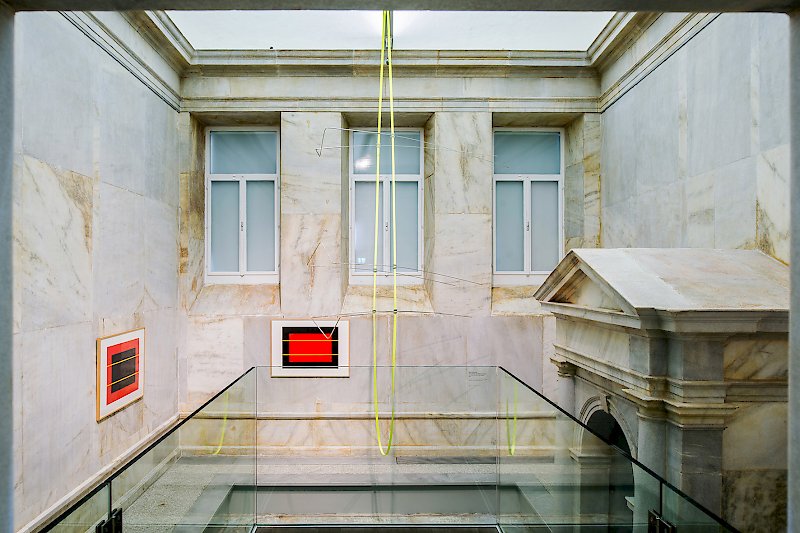
SASKIA NOOR VAN IMHOFF – SARAH PICHLKOSTNER – DONALD JUDD – ARNULF RAINER
Kanten Winkel Linien Kurven
Enacted by Rudi Fuchs
with Maarten Bertheux
February 27 - May 5, 2019
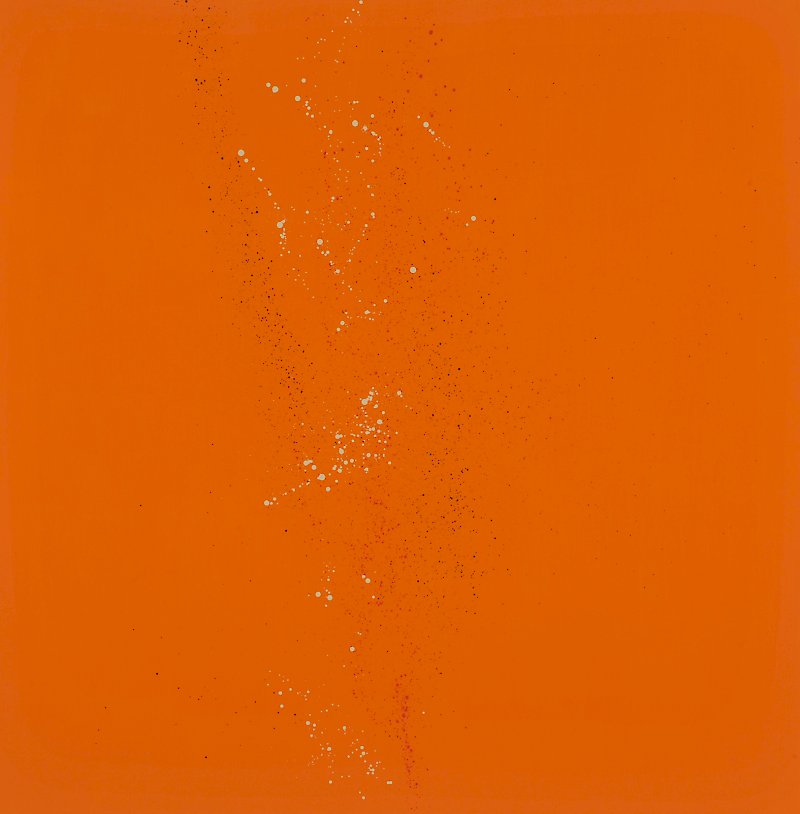
In September 1978, Marcia Hafif published in the American magazine Artforum an article, entitled “Beginning Again” in which she analyzed the context of her return to painting six years before. Her pictorial career really took off when she was based in Rome between 1961 and 1969, during which she explored programmatically a form of abstraction.* Then followed a conceptual Californian parenthesis in which the media of photography and video acted as her preferred ways of working.
October 17, 2019 – January 28, 2020
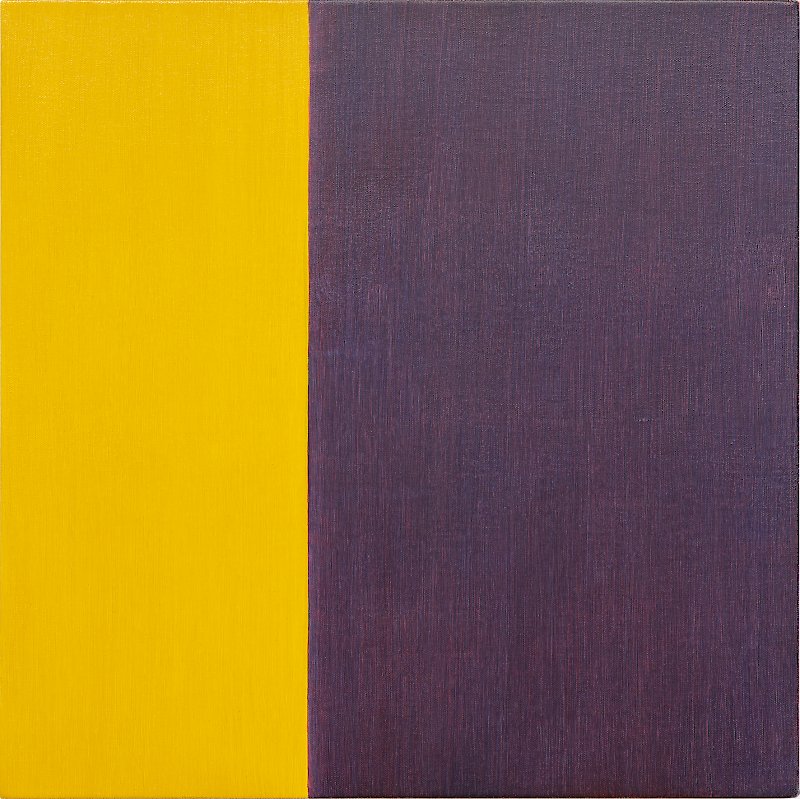
Pigment as Shape reveals the epidermic minimalism of Marcia Hafif. Instead of critically stripping bare the colors in a distant manner, she pragmatically and poetically discloses their succulent flesh. Her seemingly tautological, smooth covering of the canvases with exactly the colors that give their names takes a phenomenological turn. They extoll the pigmental materiality - a visual-spiritual substance, the exuberant inner shape of painting, calling for contemplation.
Muzeul de Artă Recentă / Museum of Recent Art
Primăverii 15, București
March 8 – May 19 2019

On 7 March, the first major retrospective in Italy of the work of Birgit Jürgenssen (Vienna, 1949–2003) will be held, among the leading artists in the international feminist avant-garde.
The wide-ranging oeuvre of Birgit Jürgenssen reflects on and deconstructs stereotypical relationships, sexuality, socially determined notions of beauty and gender relations, all with subversive humour as if they were deeper layers of her own identity.
The show, curated by Natascha Burger and Nicole Fritz and staged in collaboration with the Estate Birgit Jürgenssen, the Kunsthalle Tübingen and the Louisiana Museum of Modern Art, offers an overview of the entire oeuvre of the Austrian artist: more than 150 works produced over 40 years of research, including her drawings, collages, sculptures, photographs, rayogrammes, gouaches and cyanotypes.
The exhibition is accompanied by a catalogue, published by Prestel, with texts by Natascha Burger, Nicole Fritz, Maurizio Cattelan, Lorenzo Giusti, Jessica Morgan, Gabriele Schor, Jasper Sharp, Abigail Solomon-Godeau.

GENERATIONS
Hall 3 – Booth C33
fieramilanocity
viale Scarampo
20149 Milan
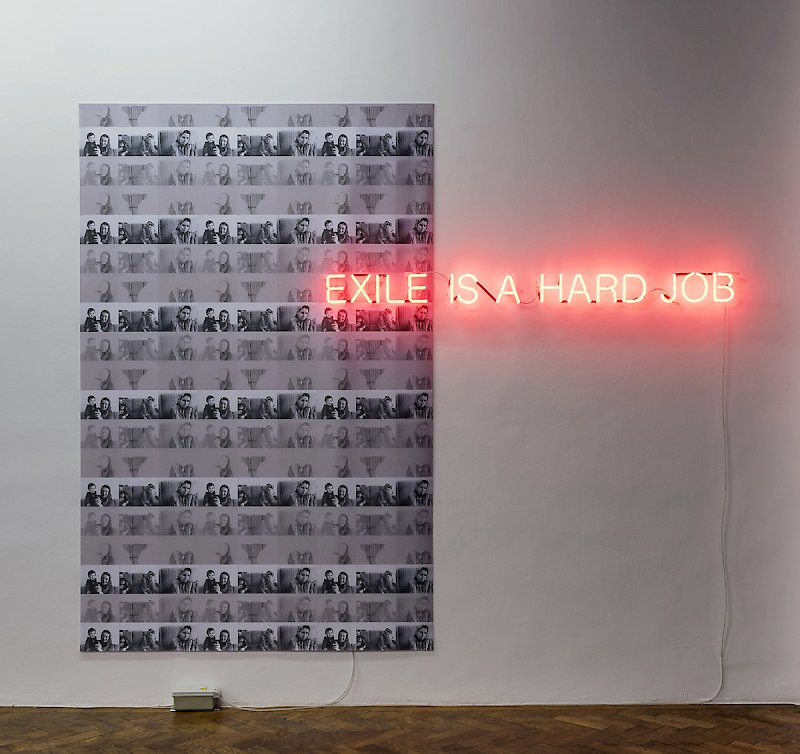
COLLABORATIONS
HALL 11.1
BOOTH B43
Koelnmesse
Messepl. 1
50679 Cologne
June 14 – September 22, 2019
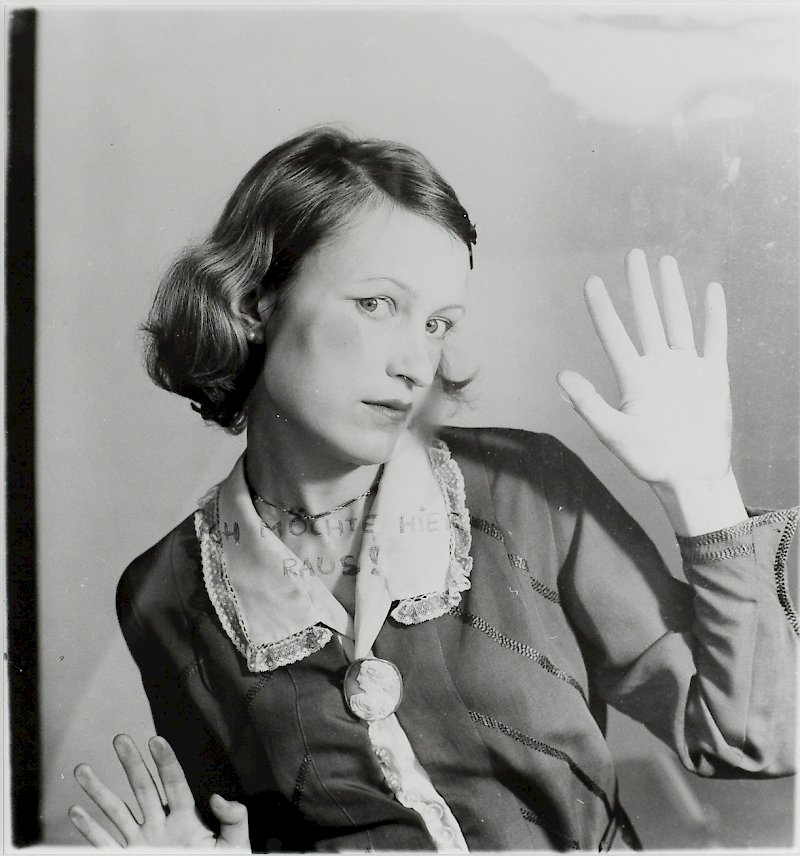
Louisiana presents the first exhibition in Scandinavia with Austrian avantgarde-artist Birgit Jürgenssen. Her sharp and humorous work revolves around rigid gender roles, identities and freedom of choice.
Birgit Jürgenssen (1949-2003) belongs to a strong circle of Austrian women artist who emerged in the 1970s such as Maria Lassnig and Valie Export. As early as the age of eight Jürgenssen was imitating works by Pablo Picasso and signing them BICASSO Jürgenssen.
Playing with different identities and the deconstruction of the patriarchal world order later became major features of Jürgenssen’s artistic activity. In drawings and photography, Jürgenssen’s preferred media, she thematized the role of woman in society, deploying an acerbic, subversive sense of humour.
In one of her best known photographic works we see Jürgenssen herself through a glass door dressed as housewife with her face pressed against the door, upon which is written “Ich möchte hier raus!” – “I want out of here!” – out of the home, that is. In a drawing from the same time the housewife is depicted literally as a wild lion in a cage. Jürgenssen’s works are not only a war-cry against the structural oppression of women; at the same time they present the possibility that a woman (or man) can break out of a role and don the mask or identity she or he wants for her/himself.
The exhibition presents more than 70 works and has been organized in collaboration with Estate Birgit Jürgenssen, Kunsthalle Tübingen and GAMeC Museum in Bergamo.
July 7 - September 21, 2019
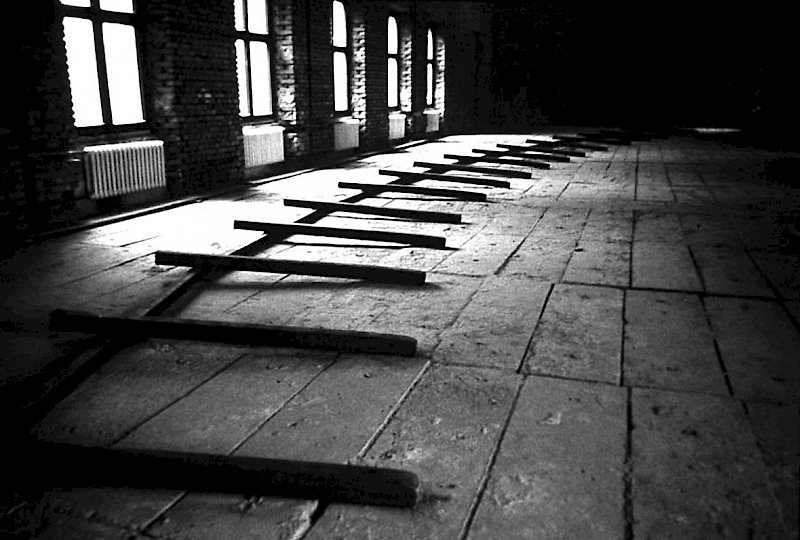
October 5, 2019 – February 9, 2020
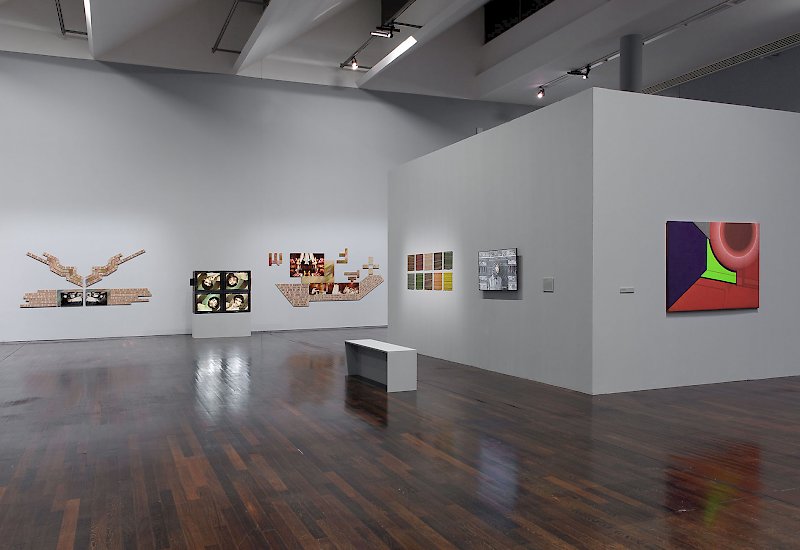
Please follow this link for more information.
On view until June 27, 2021

Please follow this link or more information.
December 14, 2019. 12 - 12.40 am

Saturday, 14th of December, 2019
12.00 - 12.40
Isin Önol in Conversation with Nil Yalter, Fiona Liewehr and Ramesh Daha
The Other is Oneself: Conference
Franz Josefs Kai 3, 1010 Vienna
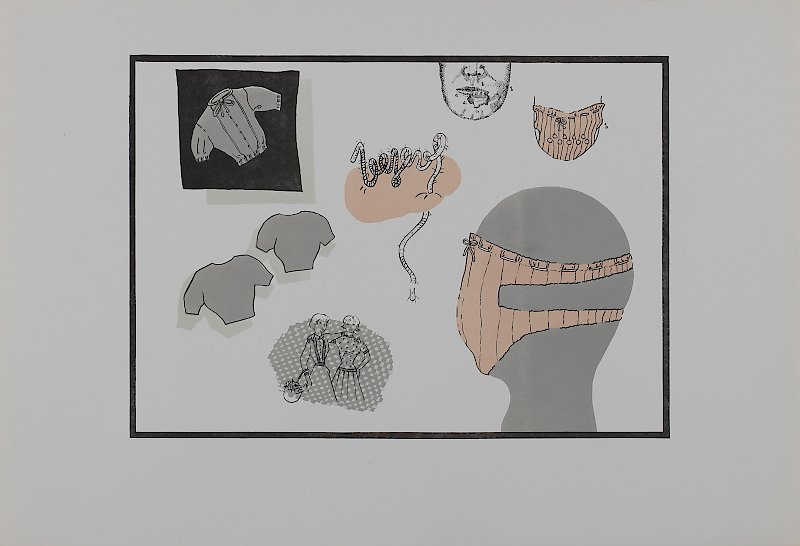
Please follow this link or more information.
May 27 – November 8, 2020

The opening exhibition of ALBERTINA MODERN, entitled 'The Beginning. Art in Austria, 1945 to 1980', offers the first-ever comprehensive overview of a period that numbers among Austrian art history’s most innovative. The Beginning presents the most important artistic stances situated at the threshold of postmodernism—from the Vienna School of Fantastic Realism to early abstraction, Viennese Actionism, kinetic and concrete art, Austria’s own version of pop art, and the socially critical realism so characteristic of Vienna.
August 16–25, 2020

All I do is make things and present them. Art presents a reality. Art doesn’t present a metaphor. The conversation with society is not: what is the function of art? The conversation with society is: what do people do with this stuff that other people make? What do people do with the idea that there are human beings making things and placing them in the world and that those things are just means for other people to understand their relationship to the world?
Lawrence Weiner
For the summer of 2020 MACRO presents TRACCE / TRACES, an exhibition by Lawrence Weiner produced by the museum with the aim of getting out of conventional spaces and looking to the sky, thanks to a series of aerial banners along the coast, from Ladispoli to Anzio.
The exhibition, devised by Luca Lo Pinto, links back to the book of the same title produced in 1970 for Galleria Sperone, edited by Germano Celant, which focused on translation. The project envisioned by Weiner shortly after Celant’s death is also a tribute to the late Italian curator.
Exactly fifty years after the release of the publication, the artist has selected ten of the fifty works included in the book. They all consist of a single word, corresponding to the past participle of a verb that suggests an action that could have happened in the past, or could be expected for the future. The verbs, isolated and removed from any syntactic context, lend themselves to open interpretation.
From 16 to 25 August, along the coastline most popular with Romans, the exhibition will present a different work each day. Though in the past there have been individual works made with airplane condensation trails (Bruce Nauman and Marinus Boezem), TRACCE / TRACES is the first solo show by an artist ever presented in the sky.
An artist’s book will be produced for the occasion, thus completing an ideal circuit.
Please follow this link for more information.
July 17– September 27, 2020
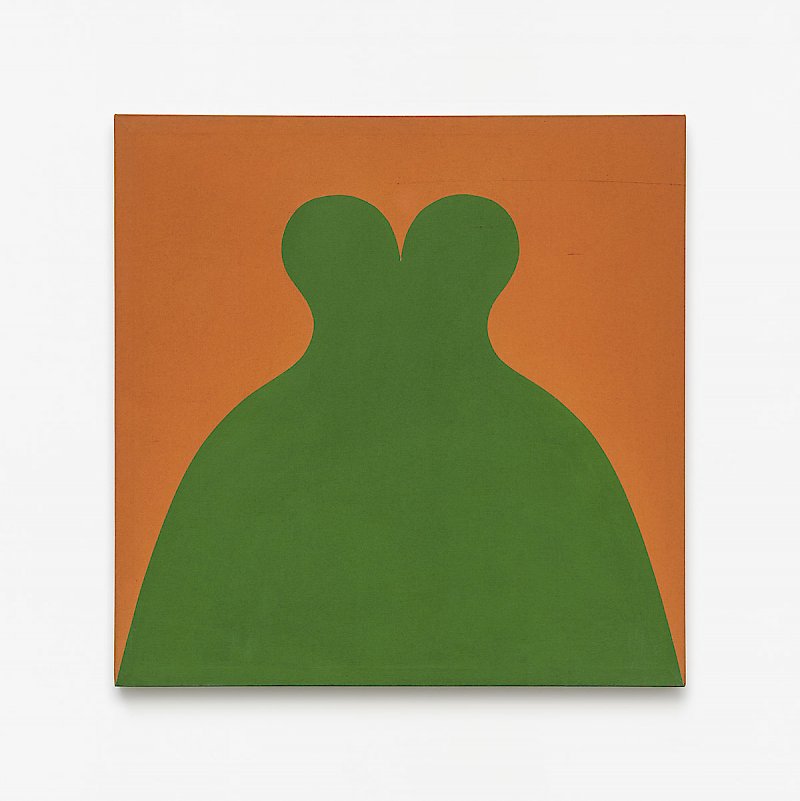
Marcia Hafif is participating in Museum for Preventive Imagination–Editorial, the first exhibition devised by MACRO's artistic director Luca Lo Pinto.
Please click here for more information.
Booth B07
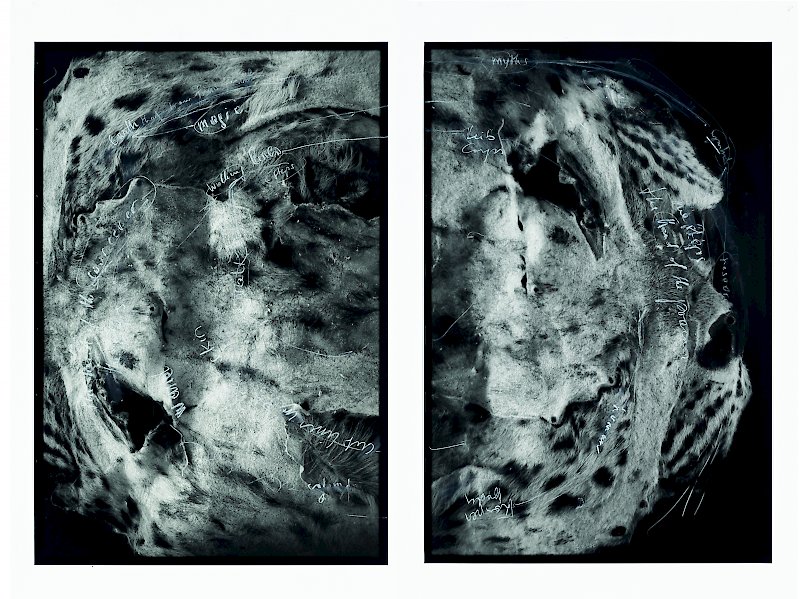

Please follow this link or more information.

Please follow this link for more information.
February 18 – May 22, 2022

The act of walking as a social phenomenon has gained renewed importance in the twenty-first century. The group exhibition WALK! at the SCHIRN provides an overview of walking as a practice in contemporary art production—a facet that has so far been rarely considered. It examines contemporary explorations and expansions of Walking Art, which had its origins in the 1960s movements of Minimalism, Land Art, and Conceptual Art.
With works by Bani Abidi, Yuji Agematsu, Allora & Calzadilla, Francis Alÿs, Daniel Beerstecher, Ellie Berry, James Bridle, Tiffany Chung, Jesse Darling, Michael Dean, Sebastián Díaz Morales, Anders Dickson, Flaneur, Hamish Fulton, Rahima Gambo, Birke Gorm, Hamza Halloubi, David Hammons, Yolande Harris, Mona Hatoum, Fabian Herkenhoener, Hiwa K, Michael Höpfner, Jan Hostettler, Regina José Galindo, Kubra Khademi, Bouchra Khalili, Kimsooja, Özlem Günyol & Mustafa Kunt, Minouk Lim, Carole McCourt, Helen Mirra, Sohei Nishino, Carmen Papalia, Signe Pierce & Alli Coates, Sascha Pohle, Pope.L, Hans Schabus, Miae Son, Cheyney Thompson, Milica Tomić
Lévy Gorvy Paris

Please follow this link for more information.
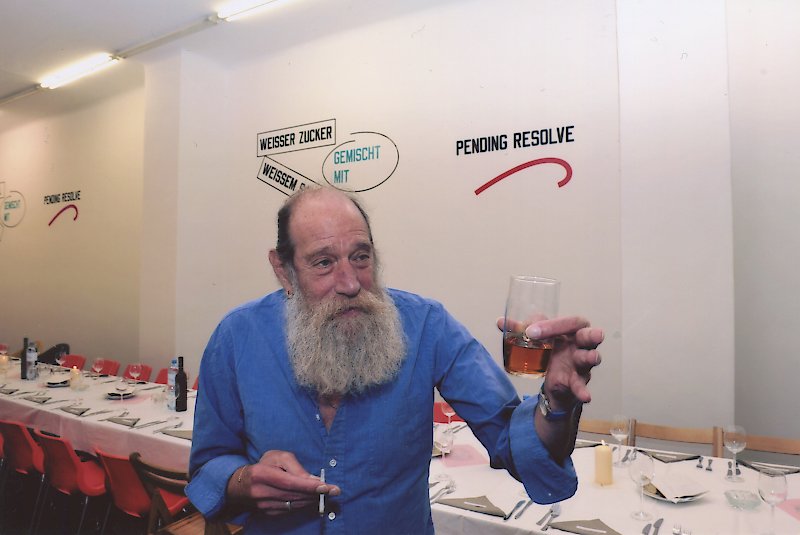
It is with the utmost sadness that we acknowledge the passing of the outstanding artist, companion and most of all our dear friend Lawrence Weiner.
Lawrence Weiner’s solitary approach to the object of art irreplaceably changed and revolutionized the meaning of the work of art. The same way he left an ineradicable mark in art history, he unforgettably shaped the cityscape of Vienna.
His intelligence was only equalled by his kindness, his radicality only by his cheerfulness as his straightforwardness only by his foresight. We are endlessly grateful for having been able to work together for 40 years and our thoughts are with Alice and Kirsten and all his beloved ones.
“IN THE STILL OF THE NIGHT”
Lawrence Weiner (1942–2021)

Joel Fisher
Revising Chance
28 pages with 12 color images
12.0 × 18.7 cm
Softcover
Published as part of the series Carpe Diem by Galerie Hubert Winter, Vienna, 2021
Edition of 99
EUR 18.00 excl. shipping costs
Orders via office@galeriewinter.at
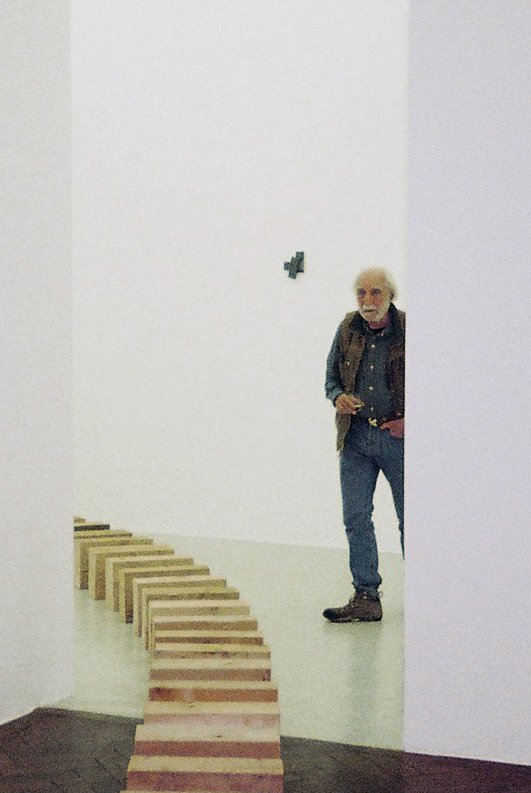
"THE ROLE OF OBJECTS IS TO RESTORE SILENCE."
(Richard Nonas, Two Trees; About Right, 2013.)
It is with profound sadness that we have to announce the passing of the outstanding artist
Richard Nonas. On May 11, Nonas passed away at the age of 85 in New York City.
The loss to his beloved ones, his friends and fellow artists is beyond measure.
We commemorate and remember more than 30 years of friendship and collaboration.
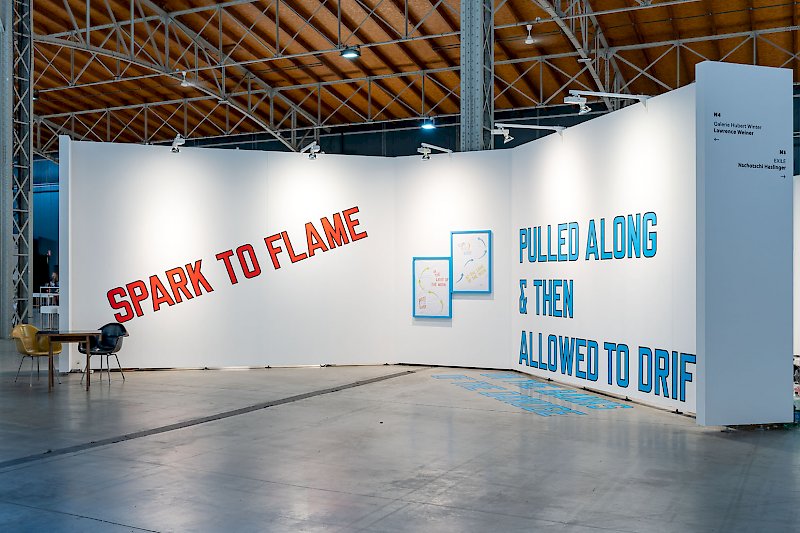
February 24 – May 22, 2022

The Kunsthalle Wien Prize is a cooperation of Kunsthalle Wien with the Academy of Fine Arts Vienna and the University of Applied Arts Vienna. For the first time, the exhibition showcasing the winners of the Kunsthalle Wien Prize 2021 will take the form of a group presentation, gathering eight artists, who graduated last year either from the Academy of Fine Arts Vienna or the University of Applied Arts Vienna.
Artists: Diana Barbosa Gil, Cho Beom-Seok, Jojo Gronostay, Ani Gurashvili, Lukas Kaufmann, Nora Severios, Anna Spanlang (with textile sculptures by Sunny Pfalzer), Chin Tsao
Curator: Anne Faucheret
Via Durini, 24
20122 Milan
Sept 18, 2021
6 – 10 pm
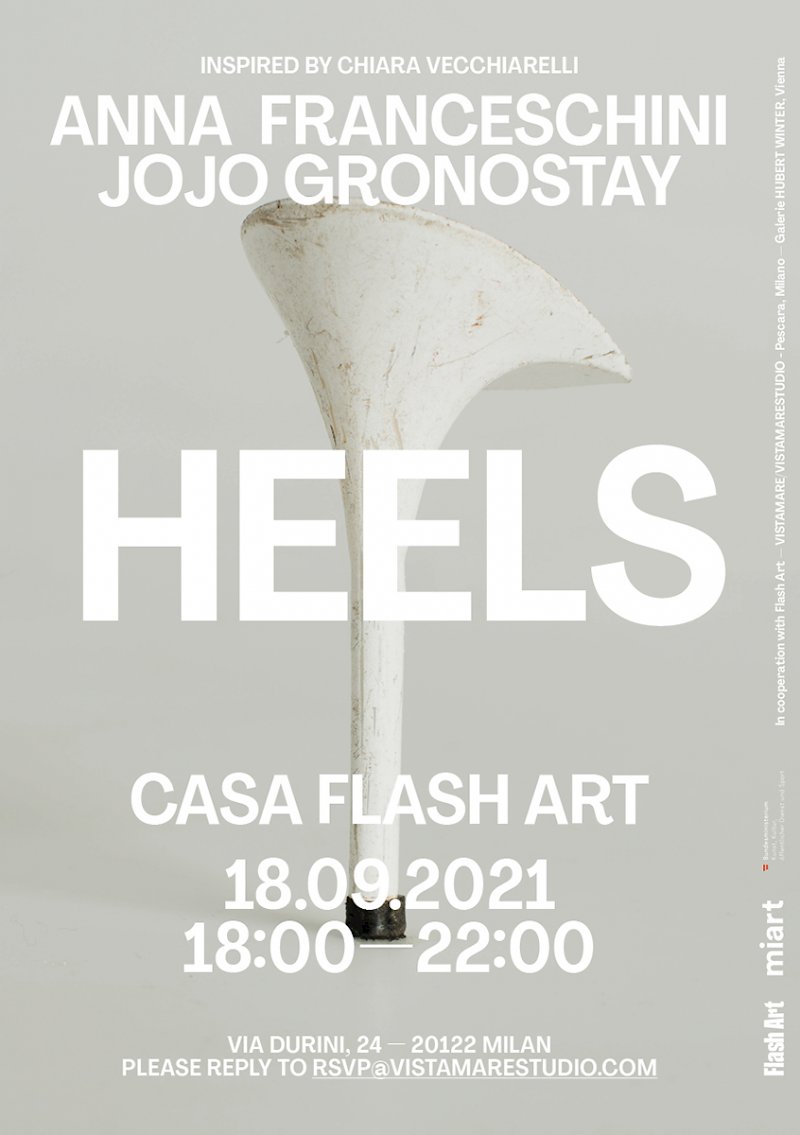
Heels – a performance by Anna Franceschini and Jojo Gronostay inspired by Chiara Vecchiarelli, and the new version of Up and Down the Heels – will take place on Saturday, September 18 in Milan, at Casa Flash Art, via Durini 24 – 20122 Milan, from 6 pm to 10 pm.
Besides the performers’ bodies, only heels fallen off shoes are in the space. They were found by Jojo Gronostay on the market stalls of Accra, Ghana. Broken, perhaps lost, carrying a feeble hope for redemption. They waited there as if they were looking for a fit, perhaps the secret twin of the one shoe they fell from, a message in a bottle sent via the ocean of second-hand goods—almost a Duchampian rendezvous with a time and a space yet unknown. Freed from the waiting, they took on a sculptural dimension in the eyes of Gronostay, and a performative one through the encounter with Anna Franceschini. Freed from the determinations that were previously assigned to them, they stand as emancipated forms forgetful of their previous life. Perhaps in search for a memory they can no longer access, they are too far from a life that saw them arriving in Africa from Europe and back to Europe from Africa, loaded with a whole range of symbols of domination, customs and politics. They somehow emancipated themselves and appear to be sharing their new agency with a group of performers and dancers.
By a swimming pool surrounded by black marble and carpet, a distilled set of gestures unfolds in the space, dislocating the distance between the feet and the ground, the living and the planet to the walls, the necks, the knees. Performed, the space breaths, the heels fall down. Once on the floor, the heels stay where they fell, like clothes fallen on the floor a moment before making love, like water filling a pond after spinning counterclockwise at the other end of the planet, inhabiting the space as if they were the silent witnesses of the one moment in which a perspective flipped, forgot its past, glimpsed at a new imaginal life. Then, the performance loops. A French poet said of heels they are meant to elevate women who are too close to nature. Heels reduces such distance until it collapses in a new paradigm. One of a life that stands on this side of the separation, always ready to molt.
Heels is presented by Galerie Hubert Winter, Vienna and Vistamare / Vistamarestudio, Pescara / Milano in collaboration with Flash Art, in the context of miart, Milan’s international modern and contemporary art fair.
The performance is open to the public upon reservation of a time slot.
Reservations can be made at rsvp@vistamarestudio.com.
Volkskundemuseum Wien

Mit Werken von:
Heike Bollig, Miklós Erhardt, Andreas Fogarasi, Jojo Gronostay, Markus Hanakam und Roswitha Schuller, Stefan Klampfer, Sascha Mikel, Orthochrome – Archiv für analoge Alltagsfotografie, Edith Payer mit Stefanie Wong, Stephanie Senge, Anna Vasof, Hui Ye
Kuratierung: Edith Payer und Gudrun Ratzinger
Follow this link for more information.

Galerie Hubert Winter is very pleased to show a selection of works by two most important key figures of their time and certainly for art history. Birgit Jürgenssen (1949-2003) and Fred Sandback (1943 – 2003). Birgit Jürgenssen was among Austria’s avantgarde in the 1970s, alongside VALIE EXPORT and Maria Lassnig. While alluding to art historical traditions like Surrealism, she unobtrusively developed an independent oeuvre that included not only a large stock of drawings, but also sculptures, experimental objects, videos and, above all, photographs.
Birgit Jürgenssen’s work with its encyclopedic approach and its diversity, which sometimes has been perceived as a lack of conclusiveness, unfortunately only starts to unfold posthumously. Narratives, pictorial motifs or structures are not intended to evoke fixed boundaries in the iconography of Birgit Jürgenssen: the series of sewn canvases by Jürgenssen proves once again her multi-layered skills and way of thinking, creating an enhancement within the limitations and delimitations. This fantastic series, will be clearly the connecting point to the spectacular sculptures of Fred Sandback – one of the central figures for minimal art.
In 1988 both artists were shown together within an exhibition at Galerie Hubert Winter in Vienna. Despite the combining formal language within the works, the year of 1988 will be a connecting point of the shown works by Birgit Jürgenssen and Fred Sandback. This might seem vague and incomplete, but whilst – after more than three decades - showing works of these two friends, colleagues and artists this condensed presentation will discuss the past, present and future as a consequence of the inclusivity or complexity.
It’s simply a matter of penetration—making the situation as dense and complex as possible without faking anything. (Fred Sandback, 1977)
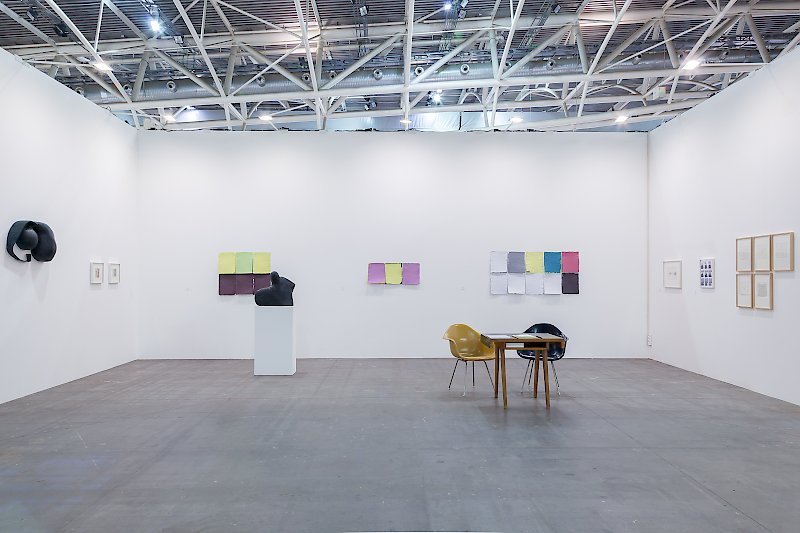
October 30, 2021 – January 31, 2022
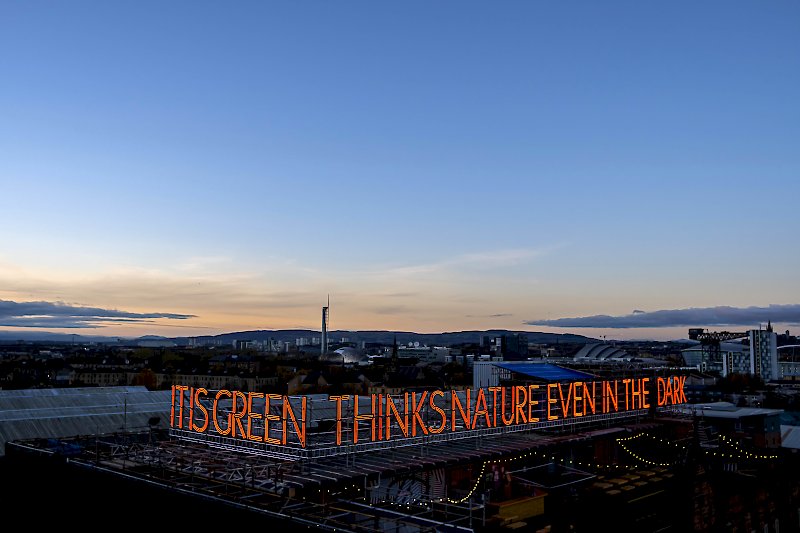
The monumental neon artwork, indestructible language, by New York-based conceptual artist and activist Mary Ellen Carroll/MEC studios illuminates the Glasgow Skyline During 2021 United Nations Climate Change Conference in Glasgow (COP26). The installation was launched on Saturday, October 30, on the eve of UN Climate Conference.
indestructible language consists of three meter high illuminated red neon characters made of lead-free glass, powered 100% by renewable energy, spelling out the phrase: IT IS GREEN THINKS NATURE EVEN IN THE DARK. The artwork is situated on the roof of The Schoolhouse, an historic Victorian building in the centre of Glasgow, visible from COP 26 and the M8, the busiest motorway in Scotland, where it will be seen by millions both locally and virtually.
Follow this link for more information.
59th International Art Exhibition of La Biennale di Venezia

We are very glad to announce that Simone Fattal has been invited to the 59th International Art Exhibition of La Biennale di Venezia.
The exhibition titled "The Milk of Dreams"—curated by Cecilia Alemani—will be held from April 23 to November 27, 2022.
February 4 – May 29, 2022

Temporary Atlas: Cartographies of the Self in Today’s Art is an exhibition that presents an alternative, complementary idea to mapping as conceived in a traditional sense.
The 14 cartographers-artists of Temporary Atlas do not gaze exclusively on the outside, but rather focus towards themselves, aiming to investigate their perceptions, identities, emotions, and physical and mental sensations. They adopt the traditional approach to mapping (a representation of reality) but expand it along unconventional paths – identity, spirituality, subconscious, and feelings or memories that interact upon each of us.
With works by Sanford Biggers, Seymour Chwast, Jeremy Deller, Sarah Entwistle, Enam Gbewonyo, Rochelle Goldberg, Oliver Laric, James Lewis, Ibrahim Mahama, Paul Maheke, Matt Mullican, Otobong Nkanga, Kiki Smith, and Walid Raad.
Follow this link for more information.

June 8 – August 10, 2022
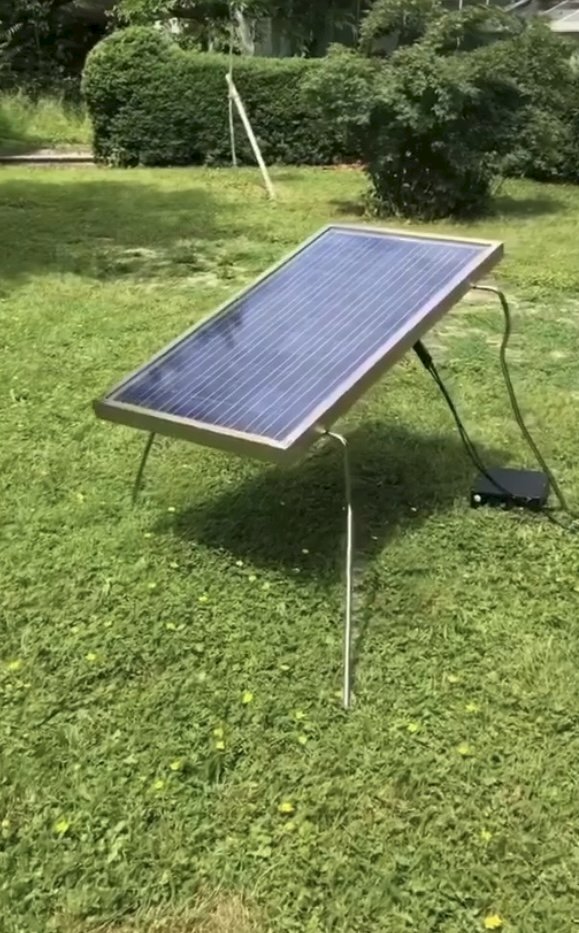
July 2 – November 6, 2022

It is rare for a museum’s collecting policy to be discussed in public. Significant policy decisions are made behind the scenes by the director of the museum in consultation with the curators of its collections. This is why the Museum der Moderne Salzburg has decided to organize a large-scale exhibition of its holdings, in particular, to show the public a selection of its new acquisitions from the past seven years. This exhibition will offer insights into the museum’s collecting policy and also provide a transparent demonstration of the criteria that determined how works have found their way into the museum’s collections.
For further information follow this link.
October 10 – December 20, 2015

February 13 – September 15, 2016

March 24 – 26 2016

The light is back
We might live in a digitalized world, but our love affair with paper has by no means diminished. Inspired by the drawing cabinets of gentlemen and connoisseurs, Galerie Hubert Winter will create a space where visitors have to get closer to the artworks – all of them related to or made out of paper.
Artists:
William Anastasi, Mary Ellen Carroll, Judith Fegerl, Michael Höpfner, Birgit Jürgenssen, Louise Lawler, Tina Lechner, Sol Lewitt, Paul Etienne Lincoln, Richard Nonas, David Robbins, Keith Sonnier, Lawrence Weiner, Hannah Wilke, Lei Xue, a.o.
November 11, 2016 - January 22, 2017

There are so many varieties of Germanic culture here in Bregenz that are not mixable, and I see that as a kind of geyser, like anything that builds up enough pressure, you have to lance it or pop it, that’s a geyser, that’s a pimple, a pimple popper. You know, that’s what it is. That’s what philosophy is. Philosophy is a popped pimple. All of these simultaneous cultures are teutonic (of a sort) and if you read tectonic as teutonic plates, one can understand the allusion to the geyser.
Lawrence Weiner, Bregenz, September 2016

Galerie Hubert Winter, Vienna is pleased to be invited by Alison M. Gingeras to take part in her curated section Sex Work at Frieze London 2017 with a selection of works from the 1970s by the Austrian artist Birgit Jürgenssen (1949 - 2003, Vienna/Austria).
Birgit Jürgenssen was an extremely gifted and virtuous draftswoman. She deconstructed female stereotypes frequently integrating allusions to surrealist themes into her masterful drawings. The female body and its metamorphosis constitute a central aspect of her work and lead to questions within the socio-critical discourse. Based on the emancipatory potential of Surrealism and on the context of feminism of the 1970s, her practice synthesises a wide range of impulses and generates a multi-layered and manifold body of work from the late 1960s on. The staging of the female body in the light of transformation (recurrent themes are: masquerades, fragmentations, fetish and fusions with animal beings) runs as leitmotif through the artist’s oeuvre. Her work has been lately described as “brilliantly disturbing” by The Guardian, exactly how the art of Birgit Jürgenssen presents itself.
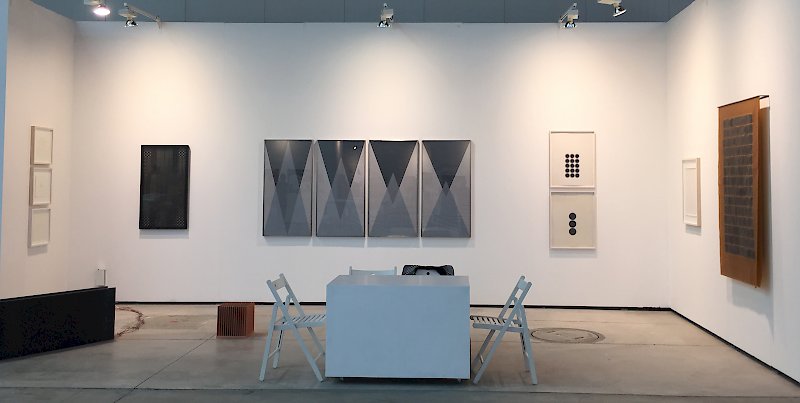
http://www.viennacontemporary.at
Reflecting materials. Graphite pigment and aluminium powder, copper wires, steel, and delicate graphite leads. Subtle material aesthetics are key factors for the oeuvre of both Helga Philipp (1939 - 2002) and Judith Fegerl (*1977). Two Austrian artists from different generations, of different anticipation.
Helga Philipp’s paintings from the late 1980s and 1990s, a group of monochrome works with simple geometric compositions, reduced forms and colours, are the main focus for the artists from 1985 onwards. Philipp produced large-scale paintings with light-dark contrasts, which, despite their simplification of form, generate an illusion of space. Her remarkable works on canvas deploy a similar optical effect, which Philipp already established with her kinetic objects. Her impasto application of paint, light reflecting materials such as graphite and aluminium pigment create an extraordinary quality and intensity. Her works on paper, graphite drawings or layered graphics on transparent paper stretch the limits of materiality and surface structure. As a pioneer of Concrete Art and Op Art in Austria after 1945, Helga Philipp has been exploring optical phenomena and their visual effects.
moment (2016) is Judith Fegerl’s latest body of works. She uses electric currents, polished steel rods, plates and electro magnets to combine disparate elements to a unity, free standing or leaned against a wall. Her works are about mobility and stasis, activity and passivity – moment has an almost meditative quality. And yet the contemplative moment can only be perceived while it is being held upright by an external electrical feed.
Fegerl combines materiality and engineering to create aesthetically and technically unprecedented works.
Helga Philipp born 1939 in Vienna; died 2002 in Vienna.
Judith Fegerl born 1977 in Vienna; lives and works in Vienna.
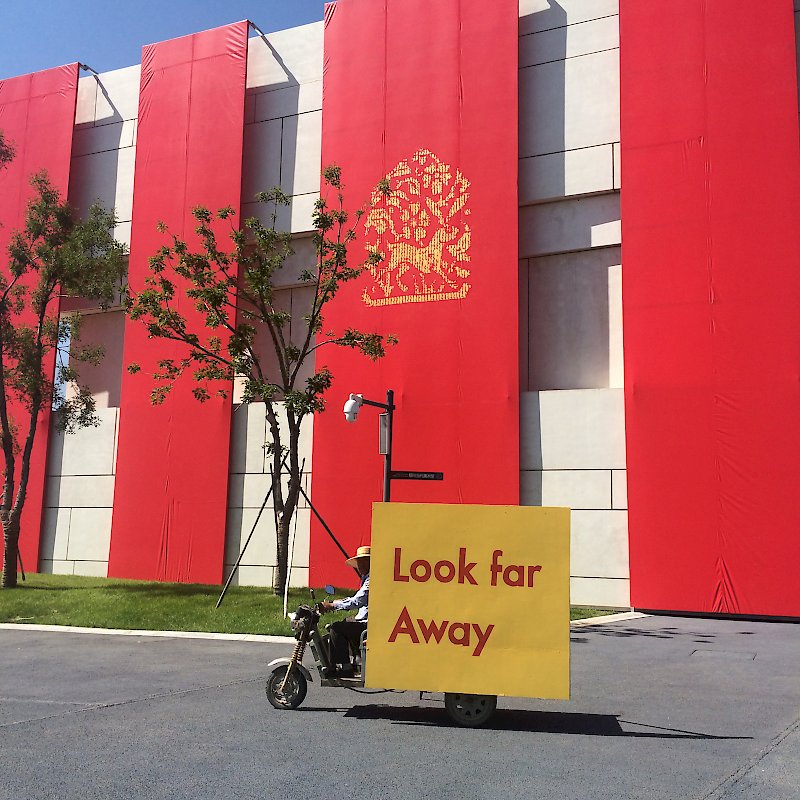
Mary Ellen Carroll
A FAKE HARE HAS 24 GOLD TEETH
NEXT TIME WITH JACKY*
curated by Bose Krishnamachari
A FAKE HARE HAS 24 GOLD TEETH
In the second stanza of Chapter IX in Jack Spicer's poem from 1961, A Fake Novel about the Life of Arthur Rimbaud, the poet wrote:
Things have passage. Most rivers eventually reach the ocean. Or a lake—an inland sea. This is like Africa in all continents.
Spicer’s language could be misread as a poetic description of a landscape painting, posing as a poem. Had he substituted another continent (in reference to trade) for Africa (in reference to migration)—or more specifically a country, it would be, “This is like China in all continents.” China is in fact, in all continents.
Spicer’s process to take Rimbaud’s actual life as the starting point is similar to how, A FAKE HARE HAS 24 GOLD TEETH utilizes the textile, Brocade with Hares, China, Northern, Mongol Period, 13th to mid 14th century, from the permanent collection at the Cleveland Museum of Art in Cleveland, Ohio as a catalyst for the conceptual underpinnings of the work realized for Yinchuan. The fragment was included in the exhibition “When Silk Was Gold: Central Asian and Chinese Textiles” at the Metropolitan Museum in New York in the spring of 1998. It places the work in the region of Yinchuan along the Yellow River, where it may in fact have actually been woven. It is fact that the general weaving technique used in this textile is characteristic of this region in China. There is also an additional warp in the weaving and this pairing of the warp evidences a technique that was introduced from the west—coming from eastern Iran. At some point, an individual made passage on the Silk Trade Route along the Yellow River and this approach was introduced to the area.
The dislocation of the hare to Yinchuan intentionally relocates an image to where it may have been originally constructed. This hare is rendered in glyphs or binary code and references the further development in weaving and the Jaquard loom that eventually became the foundation for computer programming and it functions as its aid memoire—to use a diplomatic term. This application of encryption is also a referent to Carroll’s earlier work, act of god, 1999 wherein she encrypted site photographs of Mie van der Rohe’s Glass House with the text about the building’s design. It also constructs or conflates a historical moment in the present as the future as the actual, which may not necessarily be factual. The mimeograph of the real is woven with the fake, resulting in a collision of fantasy and fact.
A FAKE HARE HAS 24 GOLD TEETH expands the pageantry of the biennial into the spectacle of diplomacy, perhaps where it rightfully belongs. This moment begins historically at the invitation that President Chiang Kai-shek extended to President John F. Kennedy and his wife, Jackie to visit China in the early 60s. After hearing about JFK’s plans for an official state visit to Europe it was then proposed to continue the passage to the east in order to solidify diplomatic relations and to discuss trade and foreign policy. The world knows why this meeting never took place. On June 26, 1963—Berlin was the furthest east in Germany that Kennedy would travel. He first appeared in the British Sector in front of the Brandenburg Gate on a provisional platform. It was architected as a modified Bauhaus structure providing a 360-degree view to “look far away” to the east in order to “see and be seen.” The DDR reciprocated and simultaneously staged their own spectacle in parity to “see and be seen” and blocked the view to the east by covering the openings of the Brandenburg Gate. It was impossible to “look far away.” A FAKE HARE HAS 24 GOLD TEETH reimagines a to-scale version of those occupied spaces on the facade of the Museum of Contemporary Art Yinchuan with the hare as the central image. (As an aside, it is worth noting that it was nearly ten years later that Kissinger seeded the ground for Nixon’s state visit to China from February 21 to 28, 1972 and the historical meeting with Mao Tse-tung. It was the first time in over two decades that images of China would be visible in the U.S.)
What was made, and what became highly visible during JFK’s historic state visit was a truck that corralled the space in front of the entrance to the Brandenburg Gate as viewed from the west that had a placard painted in bright yellow with an English text painted in red affixed to one side that was an enjoiner for the west to fulfill their treaties with the east. The truck encircled the space and then parked directly in front of where JFK stood to face the east. Both the east and the west constructed their image that would be disseminated throughout the world by the media on both sides of the wall. Immense crowds lined the streets and hung from buildings to experience the motorcade. The desire to “see and be seen” was indistinguishable from either side. That desire is no different than it is in the present.
NEXT TIME WITH JACKY* is the adjacent work to A FAKE HARE HAS 24 GOLD TEETH and will organize the drivers of the ubiquitous three wheeled motorcycle that hauls and transports goods and services within Yinchuan. The motor transport functions as the last mile in the network of trade routes within the city. The drivers will create an informal performance that will disseminate the work of art throughout the city of Yinchuan, as well as it being the work of art, in and of itself. A sign that reads, Look far Away, will be affixed to the vehicle in a similar technique as the structure that was constructed for the vehicle that encircled the Brandenburg Gate. It is a portable signifier of the biennial and the museum as the site that is dislocated from the city center. The architecting of diplomacy as an extension of culture and the historical symbols are exemplified in A FAKE HARE HAS 24 GOLD TEETH and NEXT TIME WITH JACKY, albeit within the realm of the poetic as a good, as a fake, all of which are reenactments that are performances in a medium that is intertwined within the media.
(Next Time with Jacky* is a sign that a group held up when JFK’s motorcade went by their apartment bloc. Jacky is the the first lady of the United States, Jacqueline Bouvier Kennedy. The sign makers misspelled her name as Jacky, when it is Jackie.)



Women House is the meeting of two notions: a gender - the female - and a space - the domestic one.
https://www.monnaiedeparis.fr/en/temporary-exhibitions/women-house

Galerie Hubert Winter is pleased to present a selection of works by the three Austrian artists Tina Lechner, Birgit Jürgenssen and Judith Fegerl at Artissima 2016. As diverse as their approaches initially may seem, all three artistic positions overlap at a certain point: They all work at the intersection of technical precision and competence but also in regards to the creation of narrative and visual elements. Each of them has achieved the ability to go beyond the conventional borders of media while using the precision of technical craftsmanship and expression.
Tina Lechner (born 1981 in St. Pölten, lives and works in Vienna) has been investigating these technical possibilities in analogue photography. While the photos capture a strong surface - gauging the whole range of possibility of black and white photography - the human body is coated in self-produced requisites and therefore radically reduced to a geometrical configuration. In her works humankind has lost control over its own creations, blurring the line between living and inanimate, exploring our current state with a retro-futuristic verve. It is the timeless amalgamation of styles, techniques and cultural references that makes her work so original, so striking.
Birgit Jürgenssen (1949 – 2003, Vienna) is well known for her diverse body of works, ranging from photography, drawing, video to sculpture. For Artissima 2016, we present an impressive series of Rayograms she produced in the mid 70s. Without the use of a camera the images are created in the darkroom. The images do not have any negative or positive and can be produced just once.
Birgit Jürgenssen used this effect and enhanced it sometimes with overlays while reducing figures to silhouettes, adding an enigmatic element and ephemeral details - reminiscent of surreal components and dadaist collages at times. Birgit Jürgenssen’s adaption of this camera-less method is just one aspect of her wide-ranging working in different photographical techniques and proves once more her multi-layered and extraordinary multifaceted ability experimental efforts.
Judith Fegerl (born 1977 in Vienna, lives and works in Vienna) works at the intersection of art and architecture, nature and technology, the organic and the mechanic. Fegerl creates complex networks and circuits in her works - circulations of information, energy, materiality, feeding into each other, enhancing and short-circuiting each other.
The works selected for Artissima address an alternate understanding of electric currents; while her series of sculptural paper works Easy Axis (2016) hypothetically creates a continuous flow of energy due to the used material - waxed paper, graphite and copper wire - Fegerl stretches the technical capacities of these to deliver an unique interaction between material and form. With her works, Judith Fegerl articulates a moment before a sensuous experience, an almost vibrating sense of anticipation and an understanding of time as we await the impending crash of metal.
June 21 – October 29, 2017

Fenster sind Öffnungen, die von innen den Blick auf das Außen einrahmen, während wir uns von draußen in ihnen spiegeln. Dieser Sicht auf das Innere, das Äußere und deren Wechselwirkungen geht die Ausstellung nach. Spiegelnde Fenster zeigt rund sechzig zeitgenössische Werke und einzelne historische Exponate aus der Sammlung des Belvedere,
die allesamt um Erfahrungen von Selbst und Welt kreisen. Die Arbeiten handeln von Utopien und Krisen, dem Grauen des Alltäglichen, Phänomenen des Spirituellen, der Politisierung des Körpers ebenso wie von Soziophysik und Psychonautik, von surrealen Welten und individuellen Mythologien. Im Sinne der Bedeutung von Kunst als Fenster zur Welt wirft die Ausstellung einen Blick auf das Spannungsfeld zwischen Individuum und Gesellschaft und reflektiert zugleich Auswirkungen auf Körper und Geist.
#reflections21
Mit Arbeiten von Marc Adrian, Martin Arnold, Vittorio Brodmann, Georg Chaimowicz, Adriana Czernin, Josef Dabernig, Gunter Damisch, VALIE EXPORT, Judith Fegerl, Michael Franz / Nadim Vardag, Padhi Frieberger, Bernhard Frue, Walter Gamerith, Bruno Gironcoli, Samara Golden, Judith Hopf, Alfred Hrdlicka, Iman Issa, Martha Jungwirth, Jesper Just, Tillman Kaiser, Johanna Kandl, Joseph Kosuth, Susanne Kriemann, Friedl Kubelka/Peter Weibel, Luiza Margan, Till Megerle, Henri Michaux, Muntean Rosenblum, Walter Pichler, Tobias Pils, Arnulf Rainer, Ugo Rondinone, Isa Rosenberger, Gerhard Rühm, Markus Schinwald, Toni Schmale, Anne Schneider, Richard Teschner, Simon Wachsmuth, Rudolf Wacker, Anna Witt
February 11 – March 28, 2017
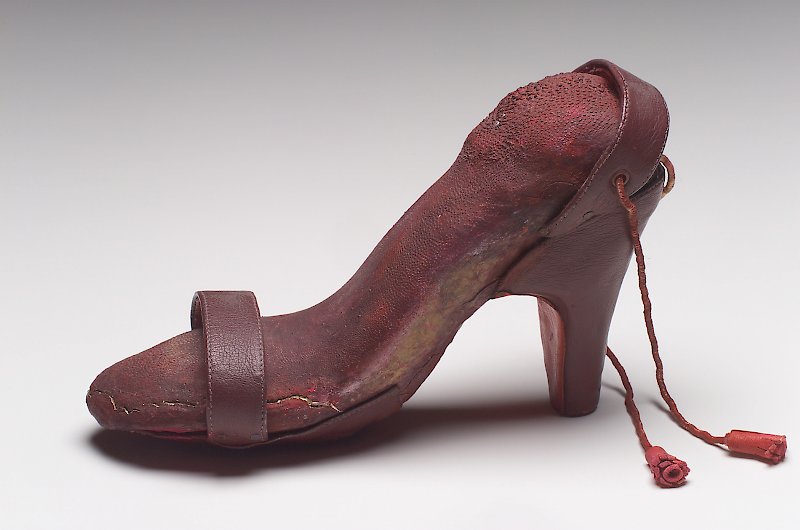
Emerging from the works by Meret Oppenheim and her fellow artist are the themes that the artistic imaginary of the time especially focused on: dream-like fantasies and erotic aberrations; the woman as an enchanted creature or a sorceress; fetishism and the relationship with nature. In the post-war years Meret’s work was enriched by her research into abstract art, strongly influencing the following generations of artists; parallels can be drawn with the work of Daniel Spoerri and Birgit Jürgenssen, among others, as well as with contemporary artists like Robert Gober and Mona Hatoum.
March 22 - 24, 2017

curated by Vivien Sakura Brandl and Andreas Spiegl
April 20 – August 13, 2017

Blueprint for a museum of contemporary art for the capital of Europe
curated by Dirk Snauwaert
...
The title, The Absent Museum, is a nod to the decisive influence that symbolist, ‘mystical-mysterious’ thinking has had and continues to have on Belgian modernity. WIELS does not have the status of a museum, but is commonly referred to as ‘the WIELS museum’. This is a token not only of recognition, but also of the expectations that the Belgian audience and public opinion have towards WIELS as an institution. WIELS therefore has decided to use this temporary exhibition to set out a substantive framework or blueprint for a possible museum of contemporary art in the capital of Europe.
With:
Francis Alÿs, Archives de l'Ambassade Universelle, Younes Baba-Ali, Jo Baer, Monika Baer, Sammy Baloji, Guillaume Bijl, Dirk Braeckman, Marcel Broodthaers, stanley brouwn, Daniel Dewar & Gregory Gicquel, Marlene Dumas, Jimmie Durham, Jana Euler, Olivier Foulon, Michel François, Ellen Gallagher, Mekhitar Garabedian, Isa Genzken, Jef Geys, Jos de Gruyter & Harald Thys, Thomas Hirschhorn, Carsten Höller, Cameron Jamie, Ann Veronica Janssens, Martin Kippenberger, Goshka Macuga, Mark Manders, Lucy McKenzie, Wesley Meuris, Nastio Mosquito, Jean-Luc Moulène, Le Mur, Oscar Murillo, Otobong Nkanga, Felix Nussbaum, Willem Oorebeek, Marina Pinsky, Lili Reynaud-Dewar, Gerhard Richter, Walter Swennen, Wolfgang Tillmans, Rosemarie Trockel, Luc Tuymans, Peter Wächtler, Christopher Williams, Nil Yalter.

Reconstitution is curated by Catherine Taft and Hamza Walker.
Reconstitution is a group exhibition that is an update and recasting of the 1987 exhibition Constitution originally organized by the art collective Group Material. The exhibition will include work by: Kathryn Andrews, Shagha Ariannia, Gretchen Bender, Dawoud Bey, Mary Ellen Carroll, Ching Ho Cheng, Tseng Kwong Chi, Sonya Clark, Joeff Davis, Sid M. Duenas, Melvin Edwards, Ridykeulous (Nicole Eisenman & A.L. Steiner), Rafa Esparza, Lauren Davis Fisher, Arshia Haq, Rachel Harrison, Sharon Hayes, Edgar Heap of Birds, Brendan Fowler/Election Reform, Gronk, Anish Kapoor, Gelare Khoshgozaran, Kang Seung Lee, Zoe Leonard, Steve Locke, M (aka Michael Chow), Van McElwee, Harold Mendez, Mike Mills, Jenny Perlin, Jefferson Pinder, Christina Quarles, Umar Rashid, Marie “Big Mama” Roseman, Peter Saul, Augustus Sherman, Maryam Taghavi, Mark Themann, Danh Vo, Christine Wang, Timothy E. Washington, Lawrence Weiner, and the AIDS Memorial Quilt.
1987 marked the 200th Anniversary of the U.S. Constitution, and on the occasion, Group Material mounted Constitution at Temple University gallery in Philadelphia. Featuring over 40 artists whose work ran the gamut from folk to conceptual art, the exhibition was nothing if not democratic. In juxtaposing the U.S. Constitution against works of contemporary art, Group Material laid claim to the Constitution not simply as it frames our government, but as a living document, one that harbors ideals against which we monitor our progress as a society.
As was the case for Group Material in 1987, recourse to the U.S. Constitution comes at a time when the electorate is deeply divided about the role of government and its priorities. But recourse to the U.S. Constitution, just as it serves to unite, also begs the question how and to what extent are the ideals of liberty, equality, and justice for all being met? Reconstitution, over and above responding to a short albeit violent swing of the socio-political pendulum, (from Obama to Trump) is responding to an electorate whose divisiveness has significantly deepened over the past 30 years.
Are we living up to our ideals of liberty, equality, and justice for all? This question cannot fail to solicit a critical posture, one that is part and parcel of art itself. Now more than ever, the so-called identity politics of the 1980s and 1990s (with art work forthrightly addressing issues of race, gender, class, nationality and religion) have become inseparable from national identity. Debates about police brutality, immigration, inequality, religious freedom, healthcare, the environment reflect who we aspire to be as a nation. Reconstitution is one mirror. Reconstitution is curated by Catherine Taft and Hamza Walker.
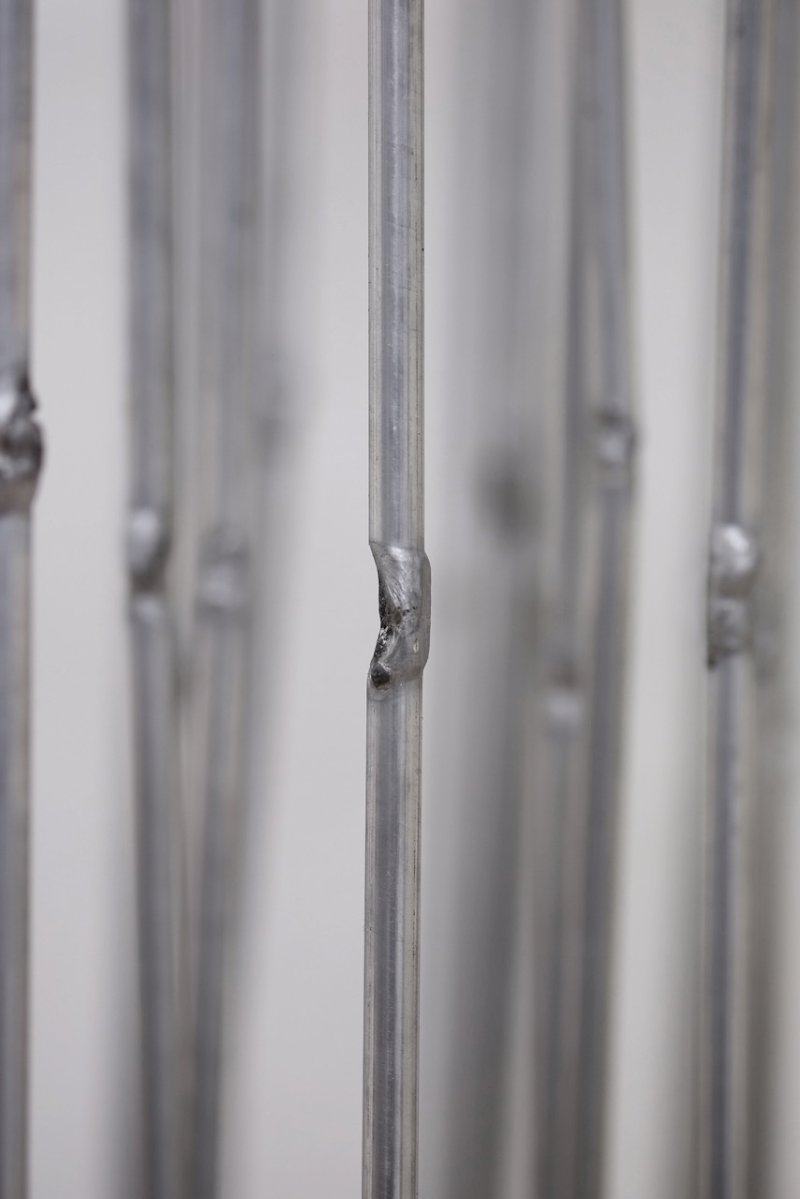
Judith Fegerl contests the given. Remodeling the materials’ structures and textures, her sculptures often take the shape of spatial interventions. The artist is not looking for easy solutions, but forges complications instead.
With great sensibility for the undercurrents of tension in supposedly simple unities – such as metal rods, the exhibition space, the institutional body – the artist lets these tensions take the lead. However, the cracks and fissures caused in the process are just occasions for new configurations: glimmering prostheses and spatial drawings – vulnerable, graceful and brutal at the same time.
A catalog will be published on the occasion of the exhibition.
October 9, 2019, 7PM
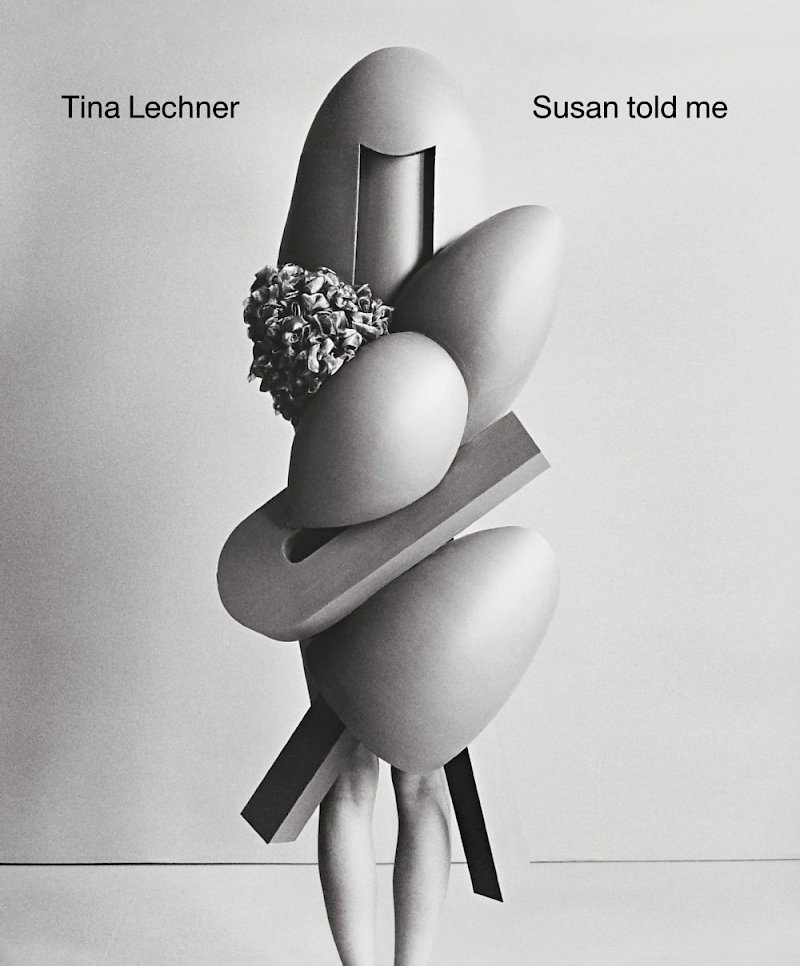
July 14 – October 15, 2017

ARCHITECTURAL MEMORY PIERCED BY ART
A line. One extended thing in the fog.
A physical mass moving, a spatial intrusion pointing, an almost pure presence lurking, connecting and anchoring. —A line; hard, heavy and slow. An apparition, and, somehow, an extremely complex intrusion into art-history.
For the strange chapel of Santa Maria della Spina has already marked and held me, as it has marked and held others in the past; held us by its actual evasiveness, marked us with its uncanny beauty, its aggressive disconnection to any available context. —Marked me, I mean, as a sculptor in the same way that only the abandoned hamlet of Viere in the French Alps has; held me by both its historical complexity and its absence of emotional solidity —marked and moved me, that is to say, by its own invasive unreality, its insistent non-corporal presence, and by my own desperate need to come to terms with that.
A fog not just of climate but of spatial strangeness; a fog of temporal dissociation, of five hundred years of slow, blurred settling into a kind of ghostly abstraction of exquisite separation, a self-sustaining, ahistorical apparition of pure presence itself.
It is that presence I mean to mark; that singular presence on the Arno's edge —the unconnected wholeness of it, as full and as empty as the river below it.
But I mean to mark it; not add to it or change it. I mean to cut another shadowy wholeness into that ambiguous and foggy wholeness; I mean to lay one shadow onto another, to cut one apparition into another.
Richard Nonas (2017)
Images:
Richard Nonas, Installation view of “…as light through fog…” ARCHITECTURAL MEMORY PIERCED BY ART, Chiesa di Santa Maria della Spina, Pisa, 2017.
© Richard Nonas
September 21–24, 2017

September 20 – November 19, 2017

October 12, 2017 - starting at 7pm

Galerie Hubert Winter lädt zu einem Abend mit Michael Bracewell, der nicht nur durch seine Romane und Kunstkritiken bekannt ist, sondern viel beachtete Sachbücher zum Thema Popkultur schrieb. Als Ausgangspunkte dienen „England is Mine: Pop Life in Albion from Wilde to Goldie“ (1997), „Roxy Music: Bryan Ferry, Brian Eno, Art, Ideas and Fashion“ (2005) oder „Roxy: The Band That Invented an Era“ (2008).
Michael Bracewell ist ein in London lebender Autor, der bereits mehrere Romane und Sachbücher publiziert hat und überwiegend über zeitgenössische Kunst und Kultur schreibt. Bracewell kuratierte ‘The Secret Public: The Last Days of The British Underground 1977 – 1988’ (Kunstverein München/ ICA, London 2007), ‘The Dark Monarch: Magic and Modernity in British Art’ (Tate St Ives, 2009) sowie im letzten Jahr '….hounded by external events…' (Maureen Paley, London, 2016). Seine ausgewählten Schriften über Bildende Kunst erschienen 2012 unter dem Titel 'The Space Between'.
Eine Veranstaltung im Rahmen von: curated by_vienna 2017: „image/reads/text“.
An event in the context of: curated by_vienna 2017: „image/reads/text“.
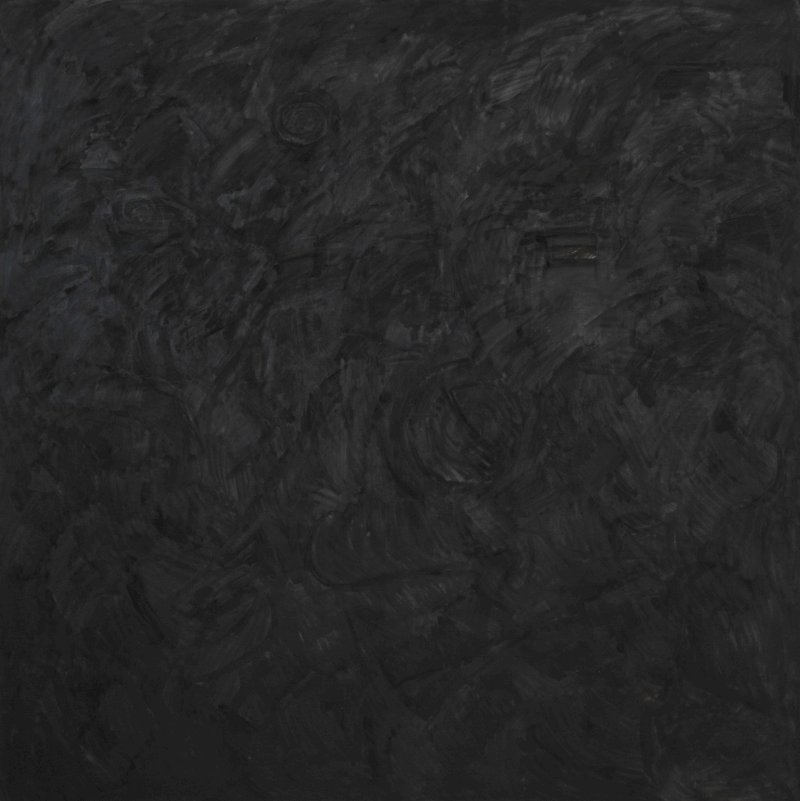
and
Marcia Hafif
September 15 - November 12, 2017
Kunsthaus Baselland
www.kunsthausbaselland.ch
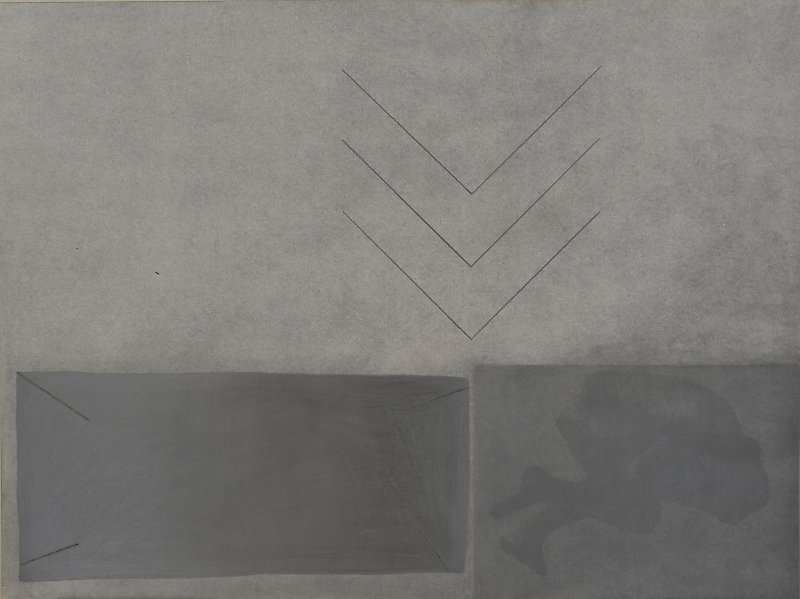
Corridor Brown, Booth Nr. 5
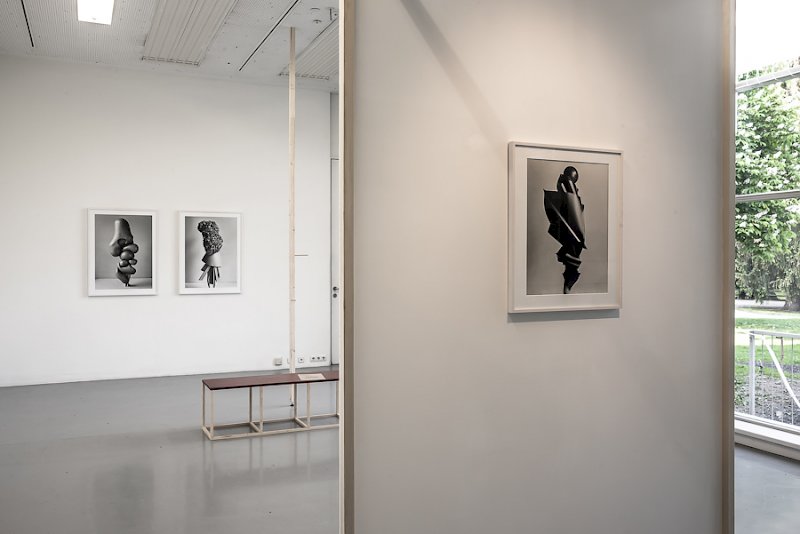
March 6 - June 8, 2018

The Shape of Time is an exhibition of remarkable artworks dating from 1800 to the present day. Borrowed from some of the most important museums and private collections across the world, they have been placed within the rooms of our Picture Gallery in dialogue with our own historical objects and artists, as stepping stones to lead us from the point at which our own collections end to the point at which we stand today.
Visitors are invited to look simultaneously backwards and forwards between objects made many centuries years apart, either of which has the potential to alter our experience of the other. (...)
The artists and pairings in the exhibition are as follows:
Tizian – J.M.W. Turner
Tizian – Pablo Picasso
Tintoretto – Kerry James Marshall
Correggio – Birgit Jürgenssen
Giorgione – Nusra Latif Qureshi
Sofonisba Anguissola – Claude Cahun
Tullio Lombardo – Felix Gonzalez-Torres
Velázquez – Edouard Manet
Caravaggio – Franz West
Bronzino – Lucian Freud
Römische Antike – Paul Cézanne
Römische Antike – Eleanor Antin
Rembrandt – Fiona Tan
Jan Brueghel d.Ä. – Steve McQueen
Peter Paul Rubens – Maria Lassnig
Rogier van der Weyden – Ron Mueck
Rembrandt – Mark Rothko
Dirck Dircksz van Santvoort – Catherine Opie
Pieter Bruegel d.Ä. – Peter Doig

Helena Almeida, Nazgol Ansarinia, Monica Bonvicini, Louise Bourgeois, Heidi Bucher, Claude Cahun, Pia Camil, Judy Chicago, Johanna Demetrakas, Lili Dujourie, Valie Export, Lucy Gunning, Mona Hatoum, BIRGIT JÜRGENSSEN, Kirsten Justesen, Karin Mack, Isa Melsheimer, Zanele Muholi, Lucy Orta, Leticia Parente, Sheila Pepe, Martha Rosler, Elsa Sahal, Niki de Saint Phalle, Miriam Schapiro, Anne-Marie Schneider, Lydia Schouten, Cindy Sherman, Laurie Simmons, Penny Slinger, Laure Tixier, Ana Vieira, Rachel Whiteread, Sue Williamson, FRANCESCA WOODMAN, NIL YALTER

Lenbachhaus, Städtische Galerie im Lenbachhaus, Munich
Starting in the 1970s, Marcia Hafif (1929–2018) probed the impact of pure color in paintings that eschewed figuration and composition to represent nothing but themselves. This reduction let Hafif undertake an analytical examination of fundamental components of painting such as material, brushwork, surface, and format. Among the works from the KiCo Collection on permanent loan to the Lenbachhaus are more than twenty paintings and drawings from all periods of Hafif’s oeuvre. They have been on view in presentations of art from the collections on several occasions since 2003.
Marcia Hafif: Films (1970–1999) turns the spotlight on a lesser-known aspect of her oeuvre: film and language. After living and working in Rome for several years in the 1960s, the painter returned to her native California, where she made friends in Los Angeles’s experimental arts scene. Exchanging ideas with artists including Robert Irwin, Nancy Buchanan, Chris Burden, and Barbara T. Smith, she branched out into new formats and media: she created sound installations, continued the exploration of photography she had begun in Rome, and shot short sequences on film. Inspired by directors such as Michelangelo Antonioni and Jean-Luc Godard, Hafif then increasingly devoted herself to moving images and produced her two longest works on film: Notes on Bob and Nancy (1970–1977) and India Time (1978).
Throughout her career as an artist, Hafif also worked on her creative writing. The medium of film allowed her to intertwine her writing and her visual art in an innovative way: many of her films are accompanied by her own texts, which, read by an offscreen voice, form a kind of commentary. This device turns the films into audiovisual essays in which Hafif addresses themes such as escapism and female self-determination—issues that have lost none of their relevance today.
With Marcia Hafif: Films (1970–1999), the Lenbachhaus screens an extensive selection of films the artist created in California, India, and New York, often working on a project for several years. The first dedicated presentation of Hafif’s work on film in Germany offers an important correction to the general perception of the artist as a painter of monochromes, a categorization she repeatedly objected to. Far from being a contradiction, it turns out, the coexistence of filmic narration and painterly minimalism in her oeuvre speaks to an open-minded creative approach that is characteristic of the American art of the 1970s with its scrutinizing reflection on its media.
Marcia Hafif was taking an active and enthusiastic interest from her home in California in the preparations for our presentation of scarcely known works from her oeuvre. Her long-standing gallerist, Fergus McCaffrey, announced the news that she had passed away suddenly in Laguna Beach, California.
Curated by Sebastian Schneider

Booth 14
www.codeartfair.dk
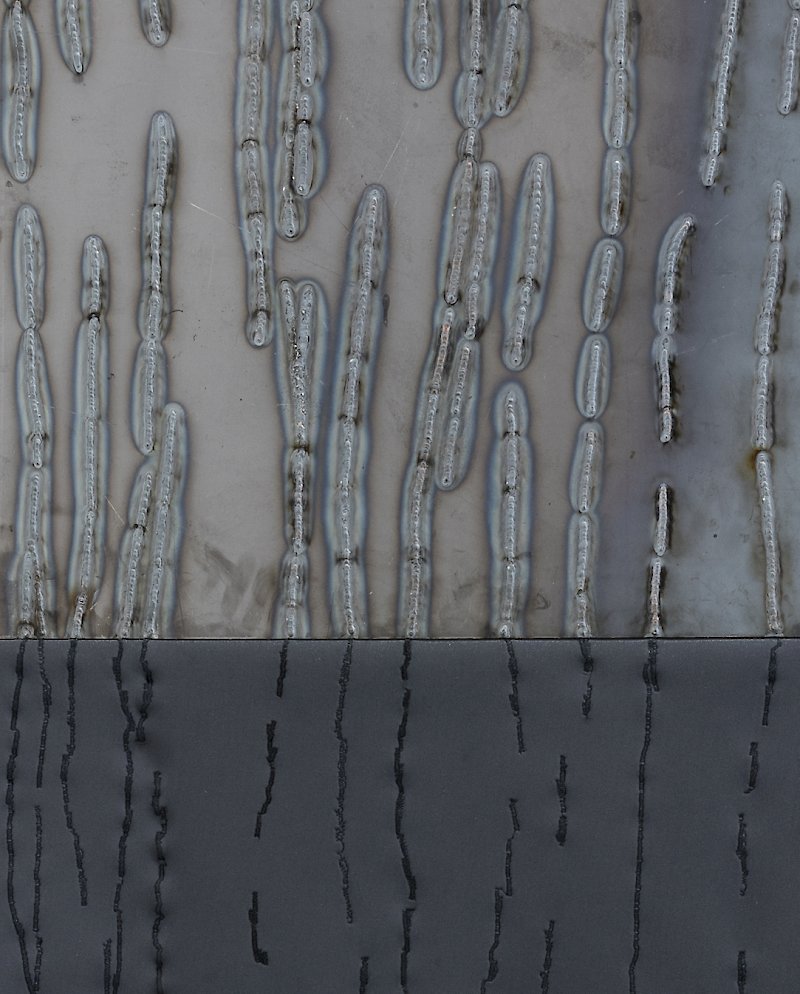
Judith Fegerl in conversation with Nina Tabassomi
“The word ‘Leitung’* that appears in black letters on the surface of the white wall that has been painted around it several times identifies the office of the Director. On the occasion of my first meeting with Nina Tabassomi, who had just assumed her position at the Taxispalais, I took a photograph of this lettering. Its meaning however—as it later turned out—manifested within the title of the exhibition and the substance of the museum.” (Judith Fegerl)
(*The German word “Leitung” has two meanings. One is “head of” or being in charge of an institution; and the other is line, as in electrical wiring, a water pipe, etc.)
“Judith Fegerl’s works act as transformers towards the exhibition space. Her sculptures, architectural operations and spatial drawings cut themselves into the substance of the exhibition space. Rather than treating the exhibition space as habitat and platform for her own works, her works shape that space. Some works are site-specific, while others are already present (in a conceptual sense). Yet they both agitate and integrate the settings in which they are presented. Objects that lie beyond the reach of our material concepts and cognitive matrix assume form in provocative, beautiful and brutal ways.” (Nina Tabassomi)
This catalogue succeeds the solo show Judith Fegerl in charge at the Taxispalais Kunsthalle Tirol. The publication witnesses and discusses interventions both sustainable and ephemeral performed at the core of the museum.
Judith Fegerl in charge, July 1—August 27, 2017, curated by Nina Tabassomi, director, Taxispalais Kunsthalle Tirol
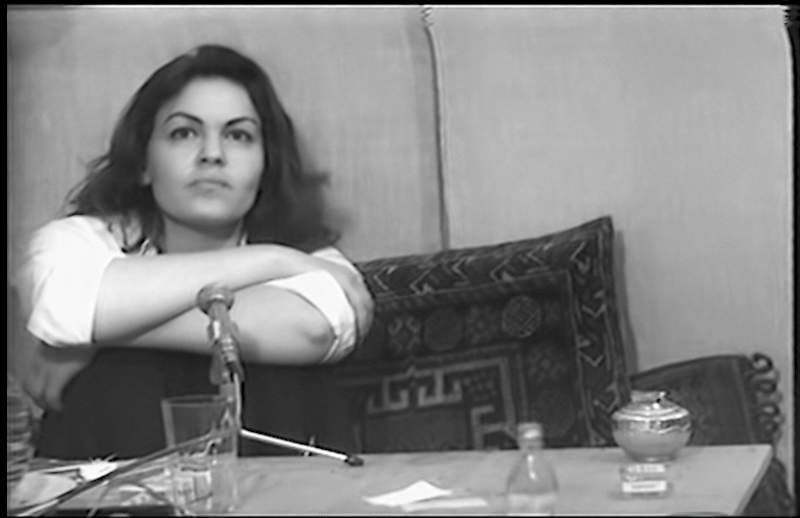

Parallel Masters
Lassallestrasse 1
1020 Vienna

Marx Halle
Karl-Farkas-Gasse 19
1030 Vienna
Austria
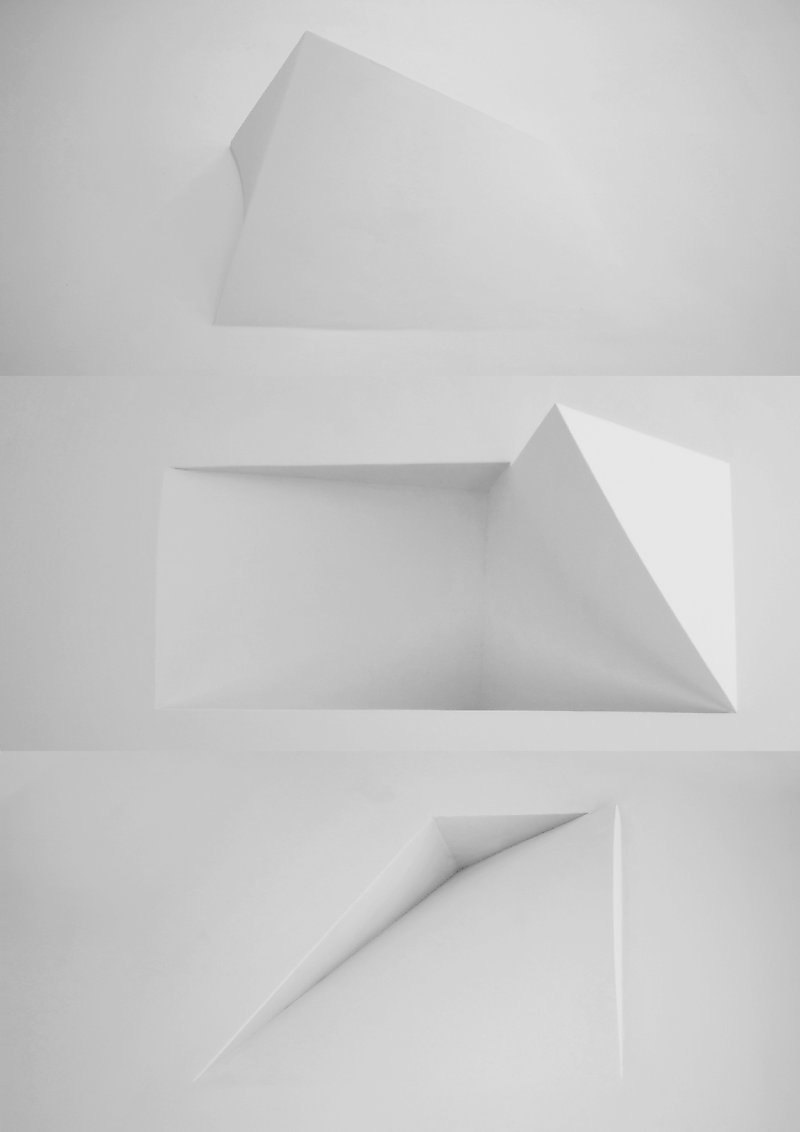
Judith Fegerl´s Intervention im neuen Gebäude der Landesgalerie Krems setzt sich mit der Drehung des architektonischen Kubus von der Donau hin zur Altstadt von Stein auseinander.


"...die politischen Ereignisse waren so stark, es war einfach nicht mehr möglich im Atelier zu sitzen und nicht daran teilzunehmen..." Nil Yalter
January 2 – June 30, 2019

Curated by Kasia Redzisz
March 9 – June 2, 2019

Since the 1970s, Nil Yalter has been working as a pioneer of socially engaged and technically advanced art. In painterly collages as well as montages and videos, the Turkish artist integrates photos, drawings, and reports by workers and migrants.
Her strong engagement with the topics of feminism, migration, and repression have led to a rediscovery of the eighty-year-old artist by international museums and collections over the past five years. She integrates the voices of the subjects of her works in a unique way and finds a consistently persuasive aesthetic form. In 2019, the Museum Ludwig will now host the Turkish artist’s first major survey exhibition.
The exhibition is organized by the Museum Ludwig in cooperation with the Center for Curatorial Studies, Hessel Museum, Bard College, Annandale-on-Hudson, New York.
May 18 – July 6, 2019
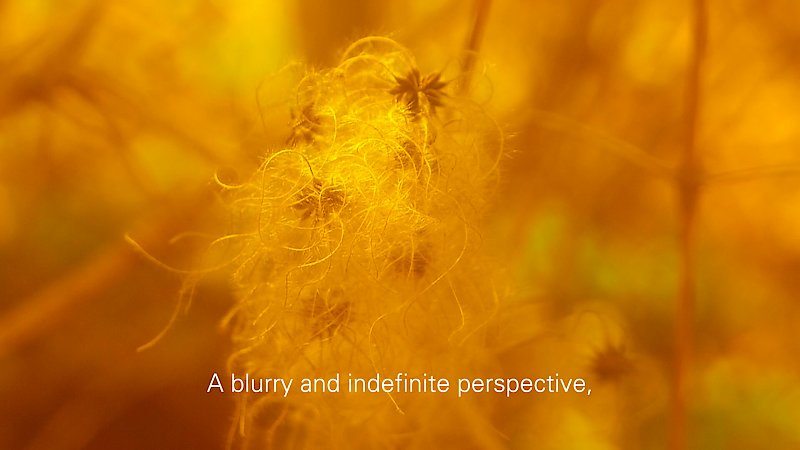
Solo exhibition, FUTUR2, Vienna
Opening: April 17, 2019, 6-9PM
Open: May 18 - July 6, 2019 (by appointment only)
June 22 – October 13, 2019

Exile Is a Hard Job will be the first solo U.S. museum exhibition of work by Nil Yalter (b. 1938, Cairo), who has been a pioneer of socially engaged art since the 1970s.
Born in Cairo, the artist grew up in Istanbul and has been living in Paris since 1965. Exile Is a Hard Job presents the diversity of her work, from previously little-known paintings to her groundbreaking early videos and multimedia installations in which she combines photography, video, drawings, and sculpture into collages. Exile Is a Hard Job originates at the Museum Ludwig in Cologne as Yalter’s first major retrospective, opening March 8, 2019. At the Hessel Museum of Art, the exhibition will focus on her prolific period from the late ’60s to the early ’80s, and will include over twenty of her most significant projects from this time.
at 5.30pm, September 12 2019

May 29 – October 6, 2019

September 26–29, 2019

viennacontemporary
Marx Halle Wien
Karl-Frakas-Gasse 19
1030 Vienna
October 19, 2019 – May 3, 2020

February 7 - April 4, 2020
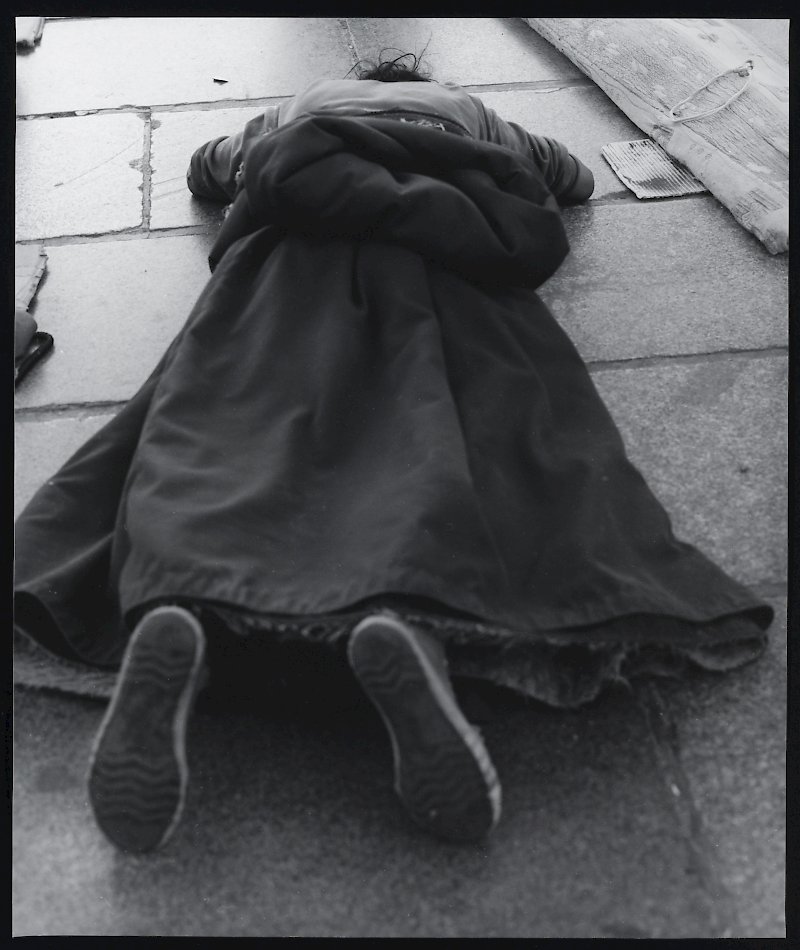
"His search for minimization is realised first and foremost in his travels to distant countries and regions. In his photographs and installations, not only does he separate the essential from the unimportant ballast, but he also firmly trains his entire focus on that essence as a narrative counterpart. No sentence, no information is too much. All that is useful is stated; all else remains unstated." (Carola Leitner)
Opening: September 4, 2020, 6–10PM

October 1, 2020–February 14, 2021

Group exhibition TI BERGAMO—Una comunità featuring Michael Höpfner.
October 7–November 11, 2020

Please follow this link or more information.

Simone Fattal
Earth Day
32 pages with 14 color images,
tipped in by hand
12.0 × 18.7 cm
Softcover
Published as part of the series Carpe Diem by Galerie Hubert Winter, Vienna, 2020
Edition of 200
EUR 18.00 excl. shipping costs
Orders via office@galeriewinter.at
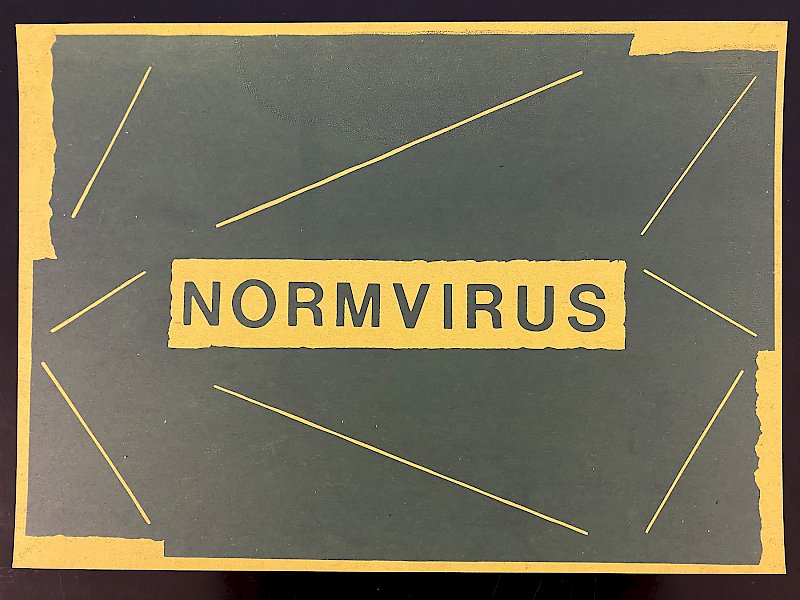
Please follow this link for our section at not—cancelled.

Galerie Hubert Winter is pleased to present a selection of paintings by Nancy Haynes, each occupied by a chromatic progression—a broadband in which one color morphs into another, a light shade growing dense and dark. To the poets is a homage to Haynes’ favorite authors and poets, resourced of her inspiration and gratitude. Her paintings are stimulated by literature with horizontal gestures hinting at a reading from left to right. To the poets makes the idea of text and subtext quite literal.
The attribution of language and convergence of an invisible mechanism is inherent part of James Lewis’ works.
Material subjected to entropic, hence temporal processes build layers of surfaces, accumulated one over another and establishes fragile relations between emotional, sensorial and statistical data. Accumulations of layers, networks of tumorous growth, encapsulate and fossilize over soft furnishings. These encrusted strata form domestic scenographies, which are polluted with sound and odour.
Follow this link for more information.

Please follow this link for more information.

We are delighted to announce the gallery's 50th anniversary.
We celebrate the anniversary with a sculpture by Lawrence Weiner publicly installed on our window front.
MAK – Museum of Applied Arts Vienna

MAK Dialogues: ALFREDO JAAR
Thu, 10.06.2021 6.30 pm
MAK – Museum of Applied Arts
Curator Bärbel Vischer in conversation with the artist Alfredo Jaar. Follow this link to join the Zoom-Talk.
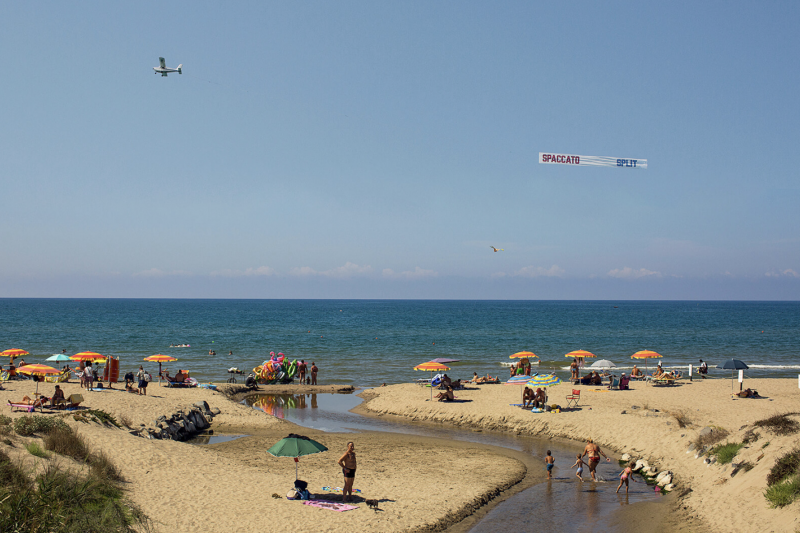
Wednesday 30 June MACRO presents the movie première of TRACCE / TRACES. The film originates from the exhibition by artist Lawrence Weiner which took place last summer through a series of aerial banners flying along the roman coast. The exhibition was produced by MACRO as part of the SUPPLEMENT section of Museum for Preventive Imagination.
In the film, produced in collaboration with RingFilm, the interpretations and reactions of the public join the artist’s voice and the documentation of the exhibition, articulated through the day to day apparitions of this unique and ephemeral experience.
Please follow this link for more information.
MACRO—Museum of Contemporary Art Rome
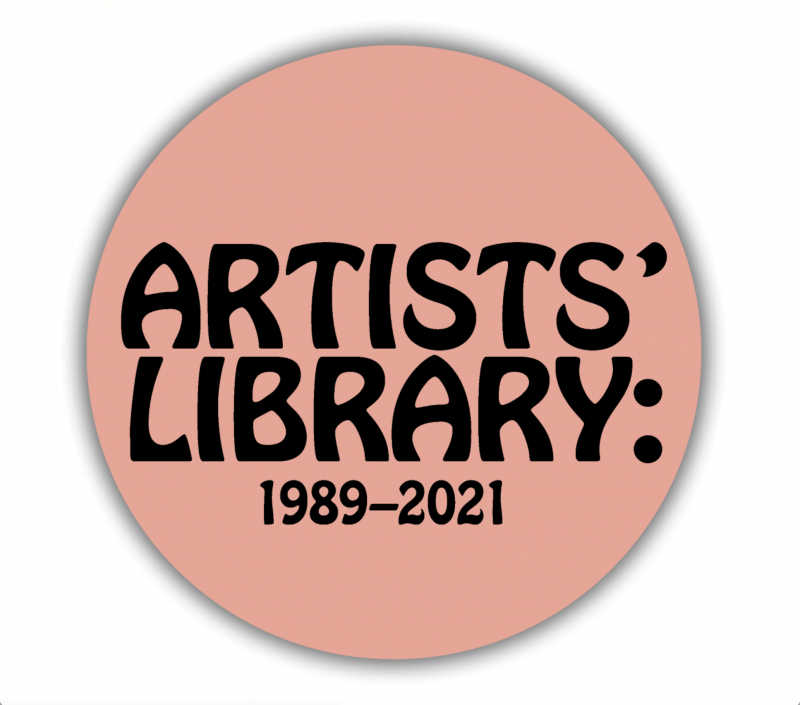
Artists’ Library: 1989–2021 is a three-dimensional bibliography, an exhibition project of the BIBLIOGRAPHIC OFFICE section, where the audience can come across and delve into the ways of thinking, writing, collecting and creating of a series of artists: Noah Barker, Éric Baudelaire, Pauline Curnier Jardin, Claudia de la Torre, Maria Eichhorn, Simone Fattal, Aaron Flint Jamison, David Horvitz, Tobias Kaspar, Giulio Paolini, Walid Raad, Georgia Sagri, Luca Trevisani. Each one has been asked to select three books by other authors in any literary genre, published since 1989, which are particularly important to their own artistic paths. A book by each of the invited artists will also be added to the selection.
Please follow this link for more information.

Follow this link for more information.
September 8, 2021 – January 9, 2022

Curated by Alberto Salvadori with Andrea Viliani, Stella Bottai, Laura Mariano
Fondazione ICA Milano in collaboration with Pompeii Commitment. Archaeological Matters presents the exhibition A breeze over the Mediterranean, first solo show in Italy dedicated to Simone Fattal (Damascus, 1942). One of the most important contemporary artists, Simone Fattal was born in Syria and grew up in Lebanon. She left the country in 1980 with the outbreak of the civil war and she settled first in the United States and later in France, where she currently lives and works. Fattal has developed and established her artistic research and practice particularly over the last decades, including different expressive media such as drawing, painting and, since 1988 (when she attended the Art Institute of San Francisco), ceramics. In her works, the artist draws forms out of natural and living matter such as clay – forms that evoke the union between the carnal and mystical dimensions, reality and imagination. Fattal shapes figures that return the deepest intimacy of our feelings and thoughts connecting them to both historical and cultural dimensions to express the value and, at the same time, the care and fragility of human life.
Follow this link for more information.
September 21, 2021 – May 15, 2022

For her first solo presentation in the UK, internationally acclaimed artist, Simone Fattal leads us on a journey of transformation. Imagining the large, brick-lined gallery to be a giant kiln, Fattal fills the space with a procession of her characteristic ceramic figures who are embarking on a spiritual and physical metamorphosis. Elements of an ancient landscape appear throughout the space; a delicate ceramic ladder, a series of carved architectural stele and a Mesopotamian ziggurat temple – connecting earth to heaven – inspire ideas around ascension and emancipation. A series of black and white etchings, drawn from Fattal’s memories of Damascus, as a garden paradise, appear as maps or windows for the voyagers.
Fattal’s work – watercolours and collages as well as sculptures made from clay and bronze – exists between figuration and abstraction. She draws on sources ranging from war and conflict, to landscape painting, ancient religions and mythologies, Sufi poetry and the fragility of the human form. She explores the impact of displacement and migration as well as the politics of archaeology and excavation. Using frequently recurring motifs and forms, and just enough detail to make her characters discernable, her works construct worlds that feel as though they have emerged – temporarily – from history and memory.
Supported by:
The Whitechapel Gallery Commissioning Council
Dorota Audemars
Erin Bell
Heloisa Genish
Leili Huth
Irene Panagopoulos
Mariela Pissioti
Alex Sainsbury
The Simone Fattal Exhibition Circle
Balice Hertling, Paris
Nicoletta Fiorucci Russo
Sarah and Gerard Griffin
Galerie Hubert Winter, Vienna
Karma International, Zürich
kaufmann repetto, Milan, New York
Galerie Lelong & Co
Galerie Tanit Munich-Beirut
Hasselblad Foundation, Göteborg
15. Oktober 2021 – 23. Januar 2022

Alfredo Jaar is the recipient of the Hasselblad Award 2020.
The award ceremony and the exhibition
Whispers and Cries
take place at the Hasselblad Foundation in Gothenburg.
Click here for more information.
Hasselblad Foundation
Ekmansgatan 8
SE-412 56
Gothenburg, Sweden
November 4, 2021 – March 26, 2022

We are pleased to announce that works by James Lewis and Haim Steinbach are featured in the exhibition
LE CLUB DU POISSON-LUNE
November 4, 2021 – March 26, 2022
With works by: Carla Adra, Maurane-Amel Arbouz, Angélique Aubrit et Ludovic Beillard, Aurilian, Flo*Souad Benaddi, Maxime Bichon, Camille Benbournane, Deborah Bowmann, Camille Brée, Hugo Brillet, Elize Charcosset, Kevin Desbouis, Lyse Fournier, Esther Gatón, Kinke Kooi, James Lewis, Thiên-Ngoc Ngô-Rioufol, Samuel Nicolle, Claudia Pagès, Gina Pane, Emma Rssx, Segondurante, Haim Steinbach, Nikhil Vettukatil.
The exhibition is curated by the newly appointed chief curator of CAPC, Cedric Fauq.
Please click here for more information.
Galerie Lelong & Co., New York

The exhibition The Temptation to Exist is constructed in two moments with two major installations, both presented in the U.S. for the first time. In juxtaposition to Jaar’s own work that was primarily created in resistance to Pinochet’s dictatorial regime in Chile (1973-1989), he has selected works from 72 artists who have sought to resist and change the world since the 1950s. These works are brought together by Jaar in an examination of memory and political participation from the last 70 years, revealing the intersection between culture and democratic life. Exhibited in close proximity to each other, the resounding voices of the artists invoke a shared history and reclamation of agency—a “we” that urges to change the world.
The list of artists includes Art Workers’ Coalition, Claudio Abate, Bas Jan Ader, Claudia Andujar, Fred Baldwin, Letizia Battaglia, Adolfo Bernal, Dawoud Bey, Frédéric Bruly Bouabré, Marcel Broodthaers, Stanley Brouwn, Paulo Bruscky, Giovanna Calvenzi, Pier Paolo Calzolari, Luis Camnitzer, Vija Celmins, Lygia Clark, Hanne Darboven, Gino de Dominicis, Juan Downey, Valie Export, LaToya Ruby Frazier, Felix Gonzalez-Torres, Hans Haacke, David Hammons, Lyle Ashton Harris, Mona Hatoum, Jenny Holzer, Emily Jacir, Joan Jonas, Birgit Jürgenssen, On Kawara, Seydou Keïta, Yves Klein, Joseph Kosuth, Jannis Kounellis, Glenn Ligon, Anna Maria Maiolino, Piero Manzoni, Gordon Matta-Clark, Cildo Meireles, Ana Mendieta, Marisa Merz, Marzia Migliora, Daido Moriyama, Zanele Muholi, Shirin Neshat, Yoko Ono, Adam Pendleton, Giuseppe Penone, Michelangelo Pistoletto, Gerhard Richter, Lotty Rosenfeld, Doris Salcedo, Carolee Schneemann, Tomatsu Shomei, Malick Sidibé, Regina Silveira, Dayanita Singh, Nancy Spero, Diamond Stingily, Atsuko Tanaka, Hank Willis Thomas, Mierle Laderman Ukeles, Cecilia Vicuña, Kara Walker, Carrie Mae Weems, Lawrence Weiner, Amanda Williams, Ernest Withers, Francesca Woodman, and Raúl Zurita.
Find out more by clicking on this link.
April 11 – June 5, 2022
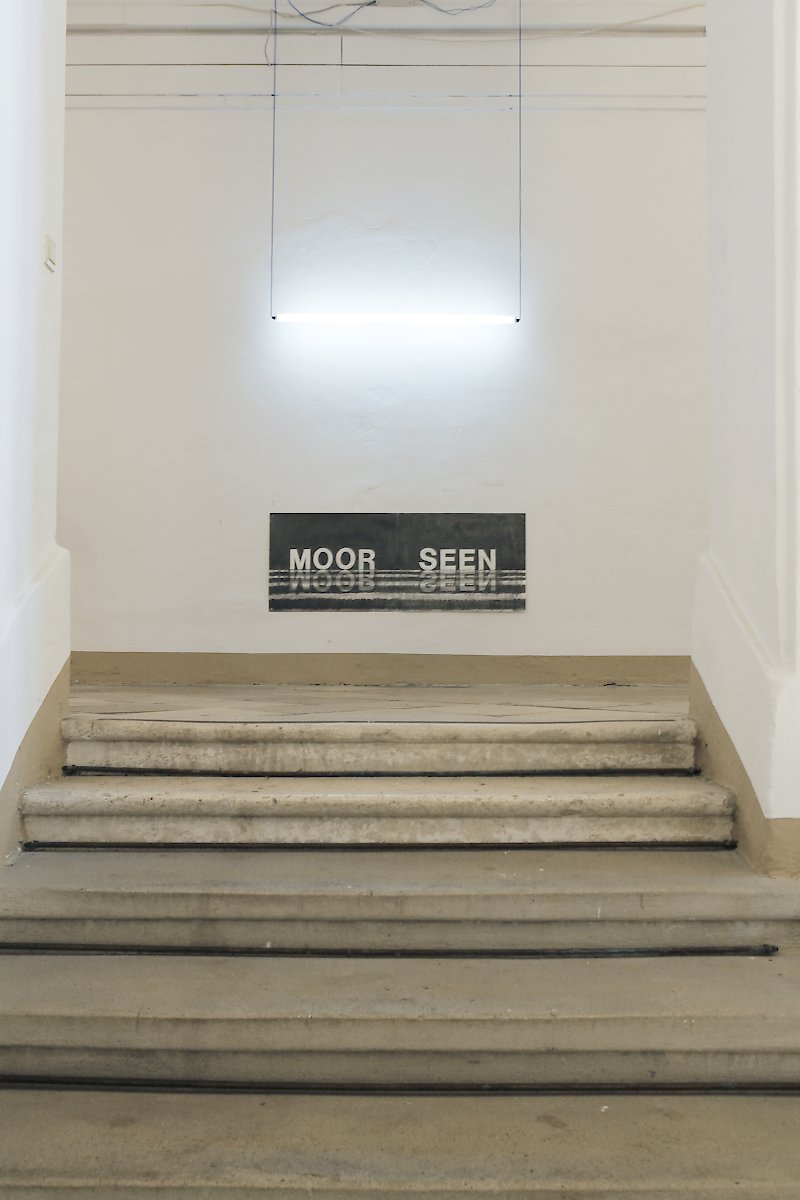
Artists: Lutz Bacher, Böhler & Orendt, Fria Elfen, Thomas Gänszler, Lena Göbel, Gábor Koós, Marianne Lang, Patrick Roman Scherer, Ekaterina Shapiro-Obermair, Michael Strasser, Franz Vana, Andreas Werner
Curator: Barbara Horvath
Opening: Sunday, April 10, 2022. 13 – 18 Uhr.
June 18, 2022, 1pm
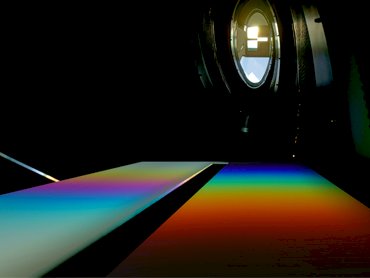
Nach dreijähriger Planung wird das Projekt und die dauerhafte Installation Lichte Nacht der Iris / The Rainbow's Missing Colours im Deutschen Romantik-Museum in Frankfurt am Main eröffnet.
Da die Lichtinstallation mit Sonnenlicht und Heliostat operiert, findet die Eröffnung nur statt, wenn für diesen Tag Sonnenschein vorhergesagt ist. (Ausweichtermin am Folgetag oder im September 2022).
Anmeldung zur Eröffnung unter folgender Adresse: info@freies-deutsches-hochstift.de
59th International Art Exhibition of La Biennale di Venezia
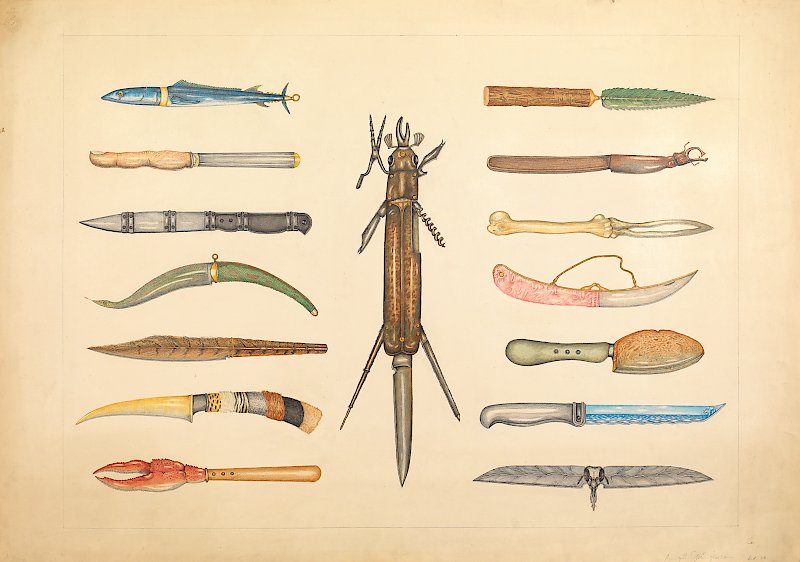
We are very pleased to announce the forthcoming participation of Birgit Jürgenssen in the upcoming 59th Venice Biennale. The exhibition titled The Milk of Dreams—curated by Cecilia Alemani—will be held from April 23 to November 27, 2022.
Birgit Jürgenssen’s Œuvre will be presented in the context of the Biennale’s "guiding questions […], which focus on three themes in particular: the representation of bodies and their metamorphoses; the relationship between individuals and technologies; the connection between bodies and the earth." [1]
"It is personal achievements that count. In the end, there are only good drawings, good photos, good pieces of work." —Birgit Jürgenssen
Please follow this link for more information.
[1] See Statement by Cecilia Alemani—Curator of the 59th International Art Exhibition of La Biennale di Venezia, here.
April 2 – May 6, 2022
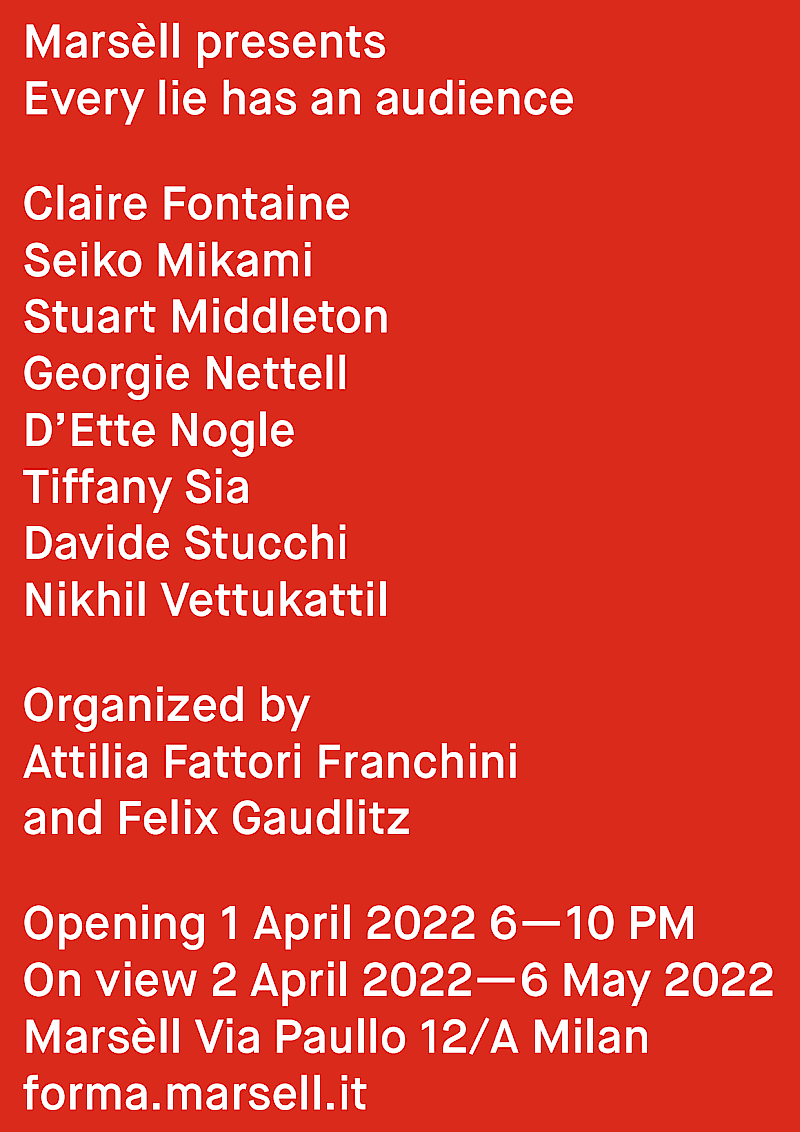
The show Every lie has an audience presents a group of artistic practices that observe, deconstruct, and comment upon the complexity of an over-mediated financialized present. Rather than posing a nihilistic political view—whilst using a broad range of approaches—the works in the show critically use subversion, paradox, reaction, brutality, ambiguity, romance, and humor to note and speculate the offering of transformative alternatives for dissent.
With works by: Claire Fontaine, Seiko Mikami, Stuart Middleton, Georgie Nettell, D'Ette Nogle, Tiffany Sia, Davide Stucchi, Nikhil Vettukattil
Organized by Attilia Fattori Franchini and Felix Gaudlitz.
Marsèll
Via Paullo 12/A
Milan

